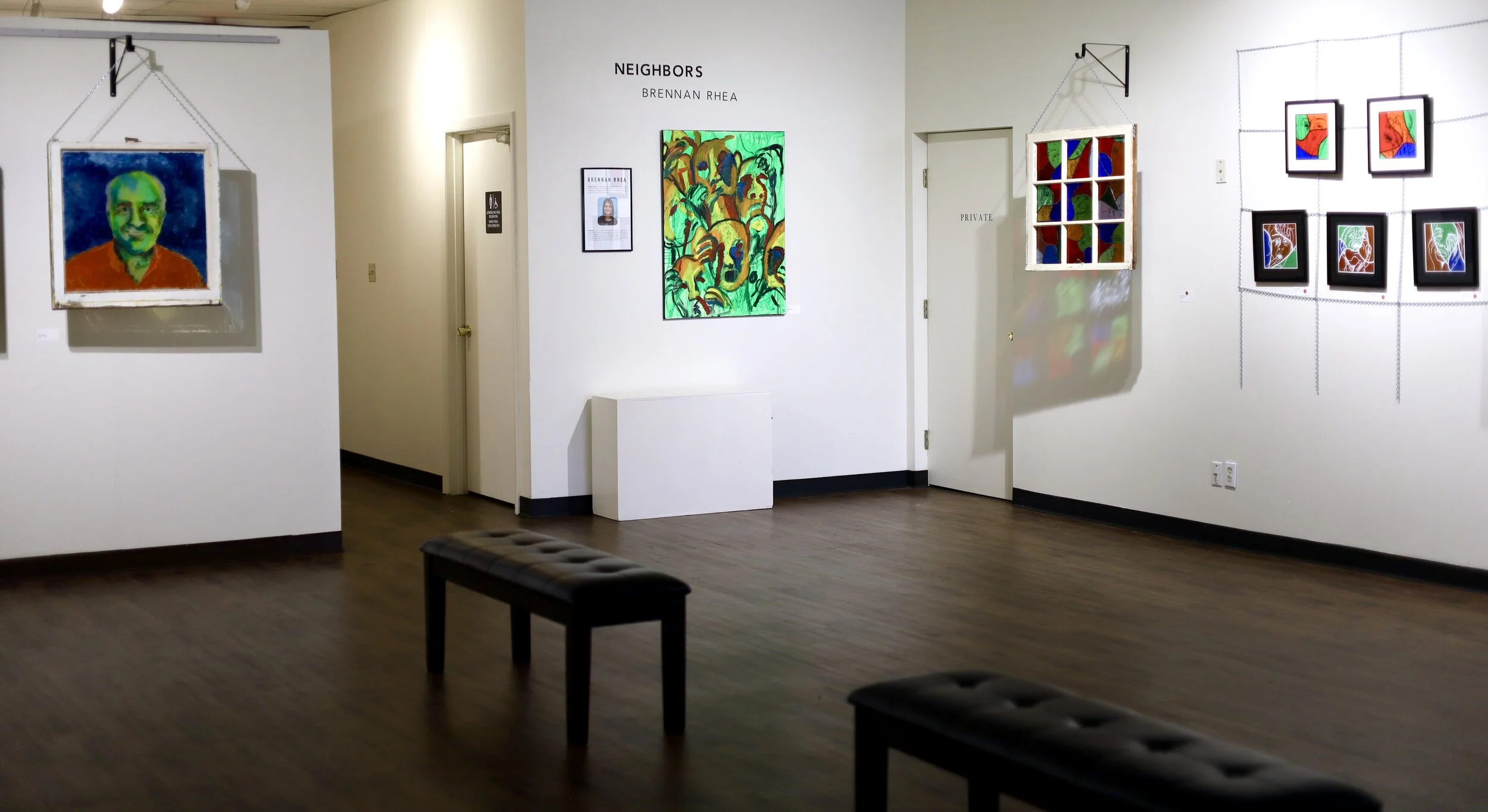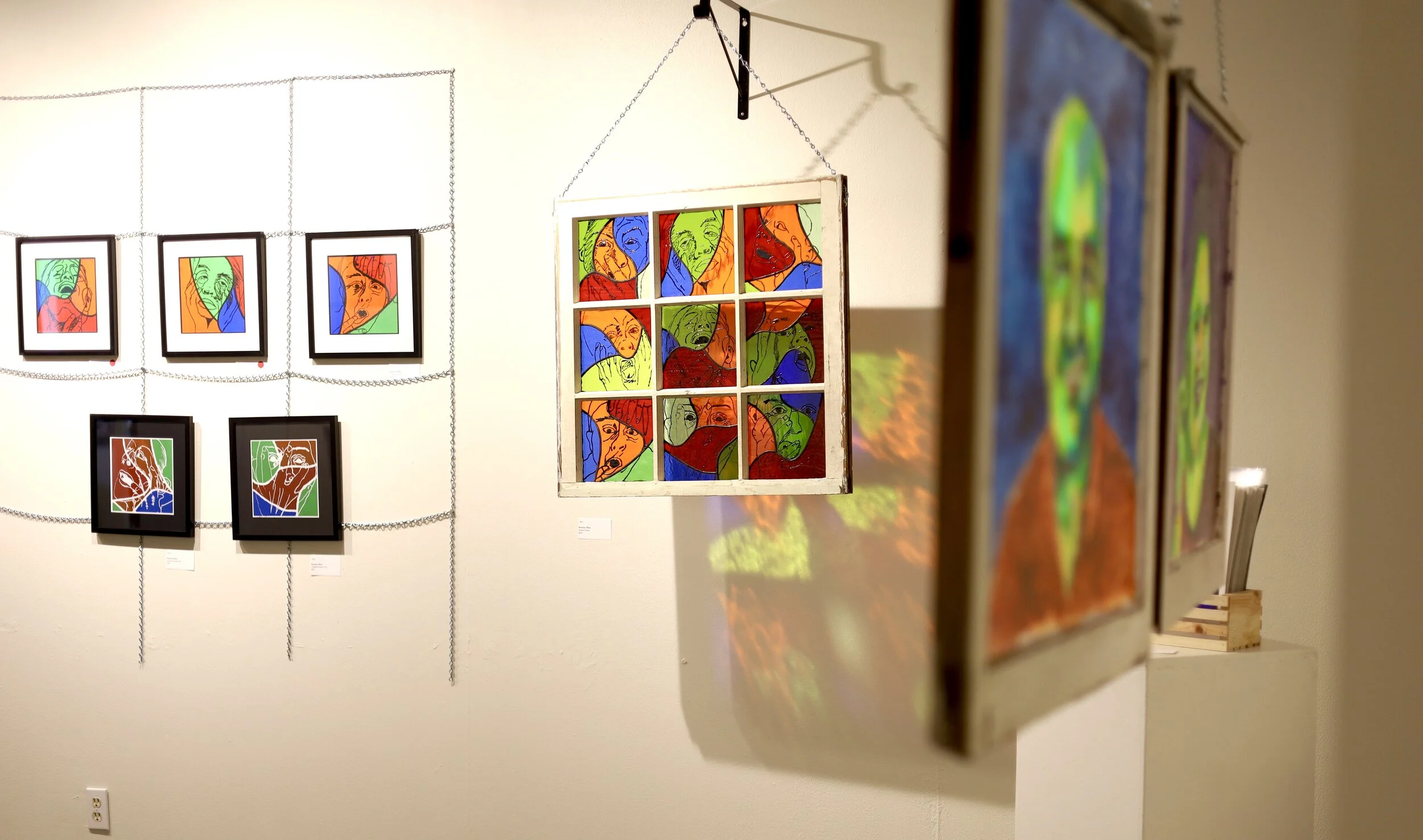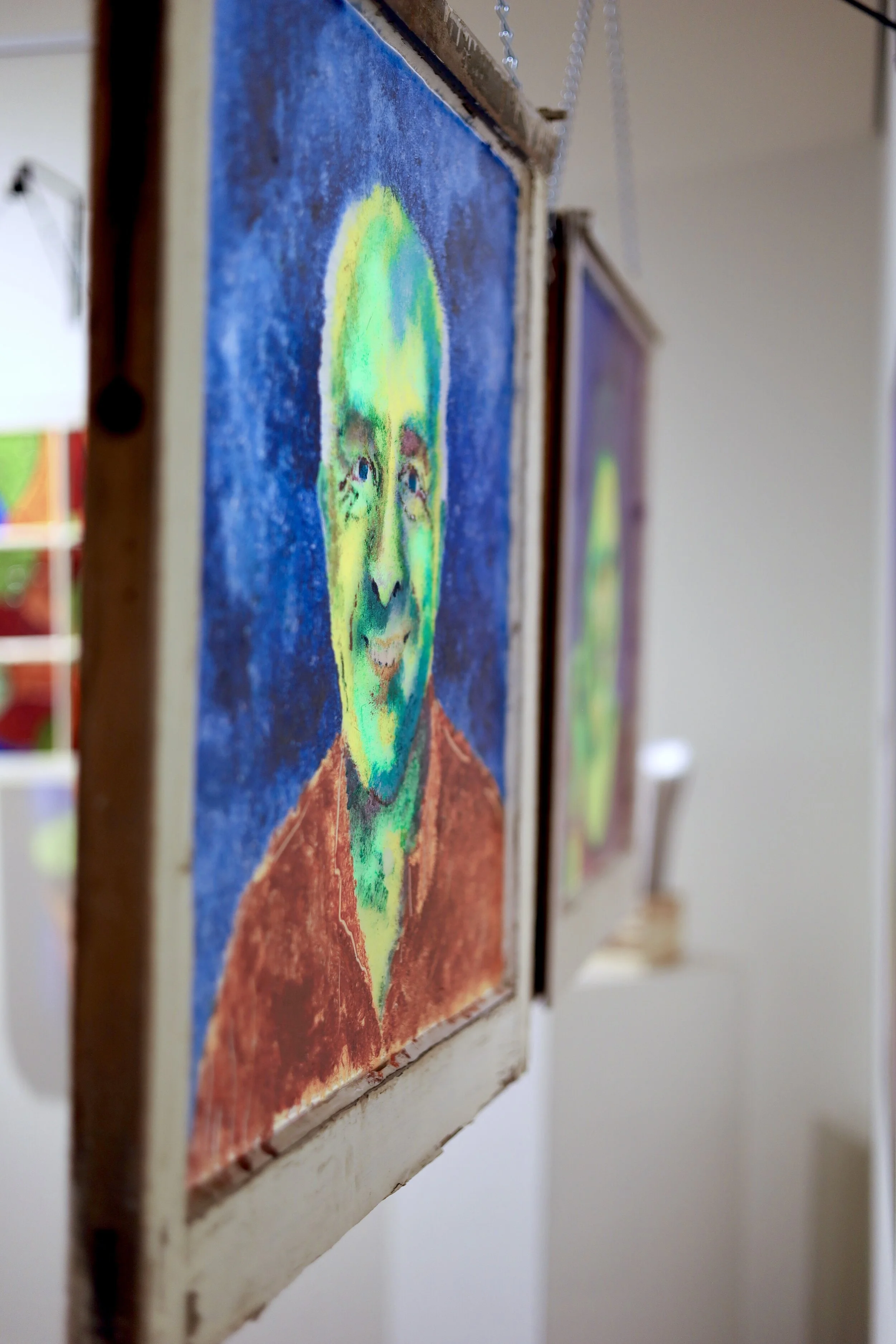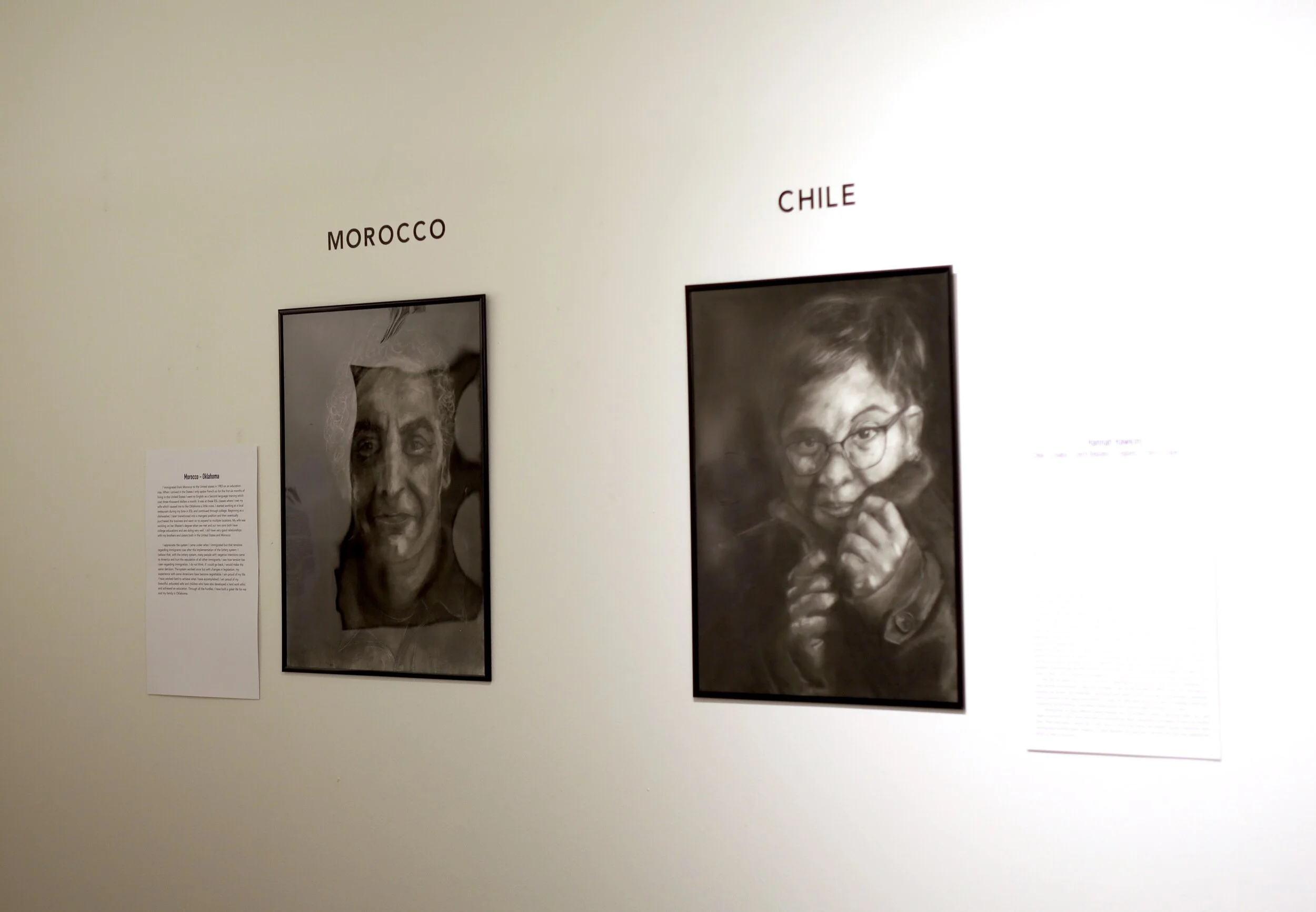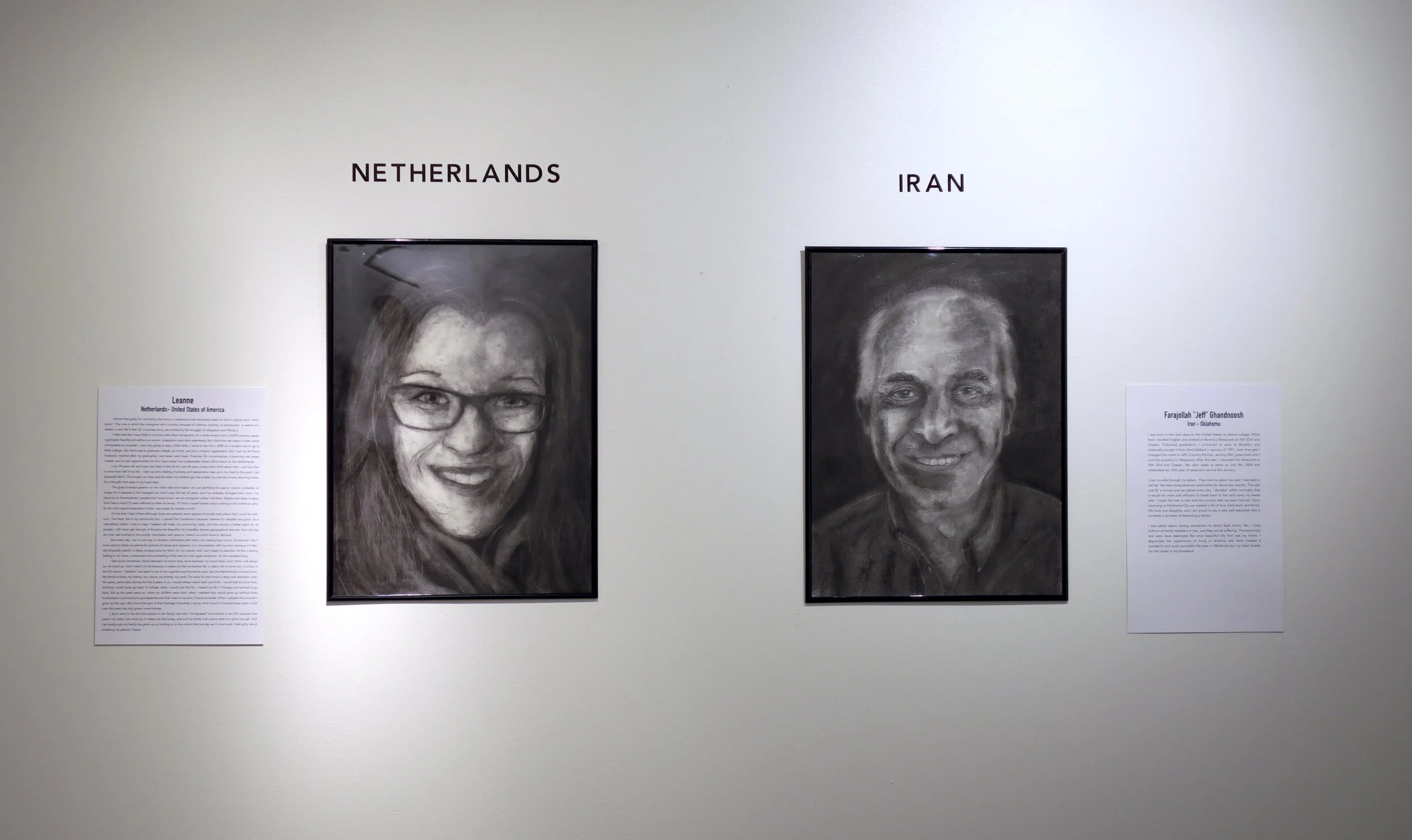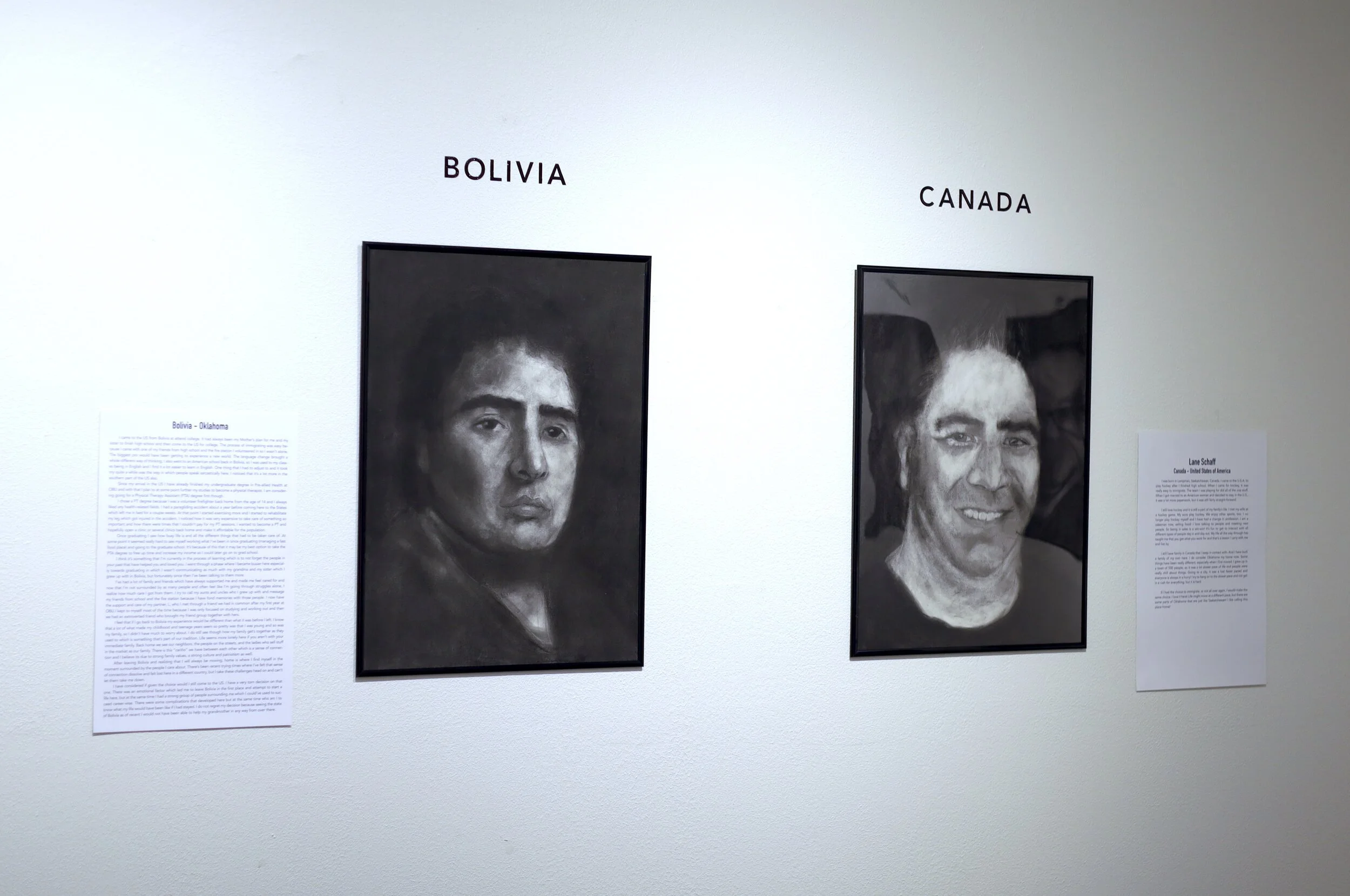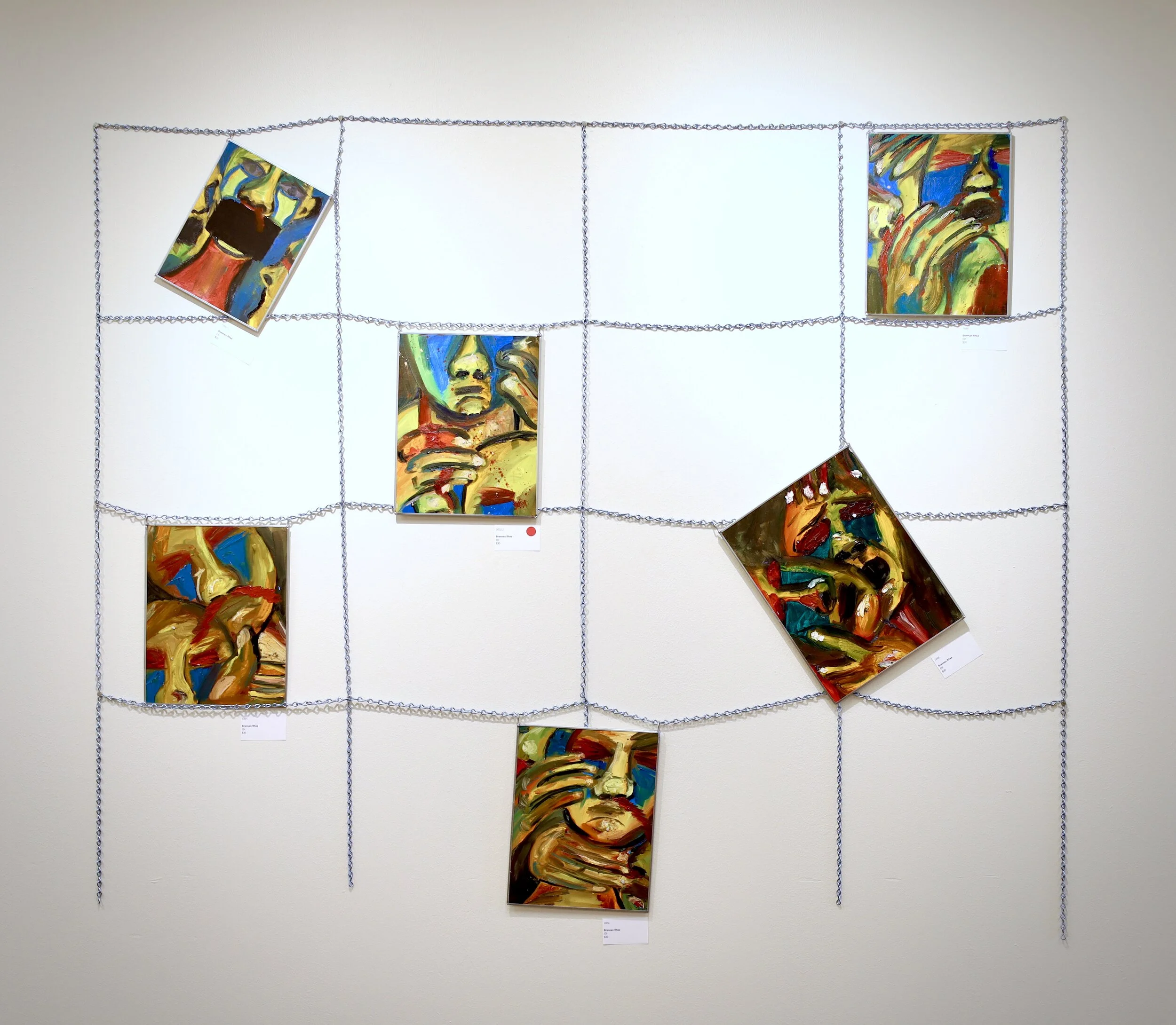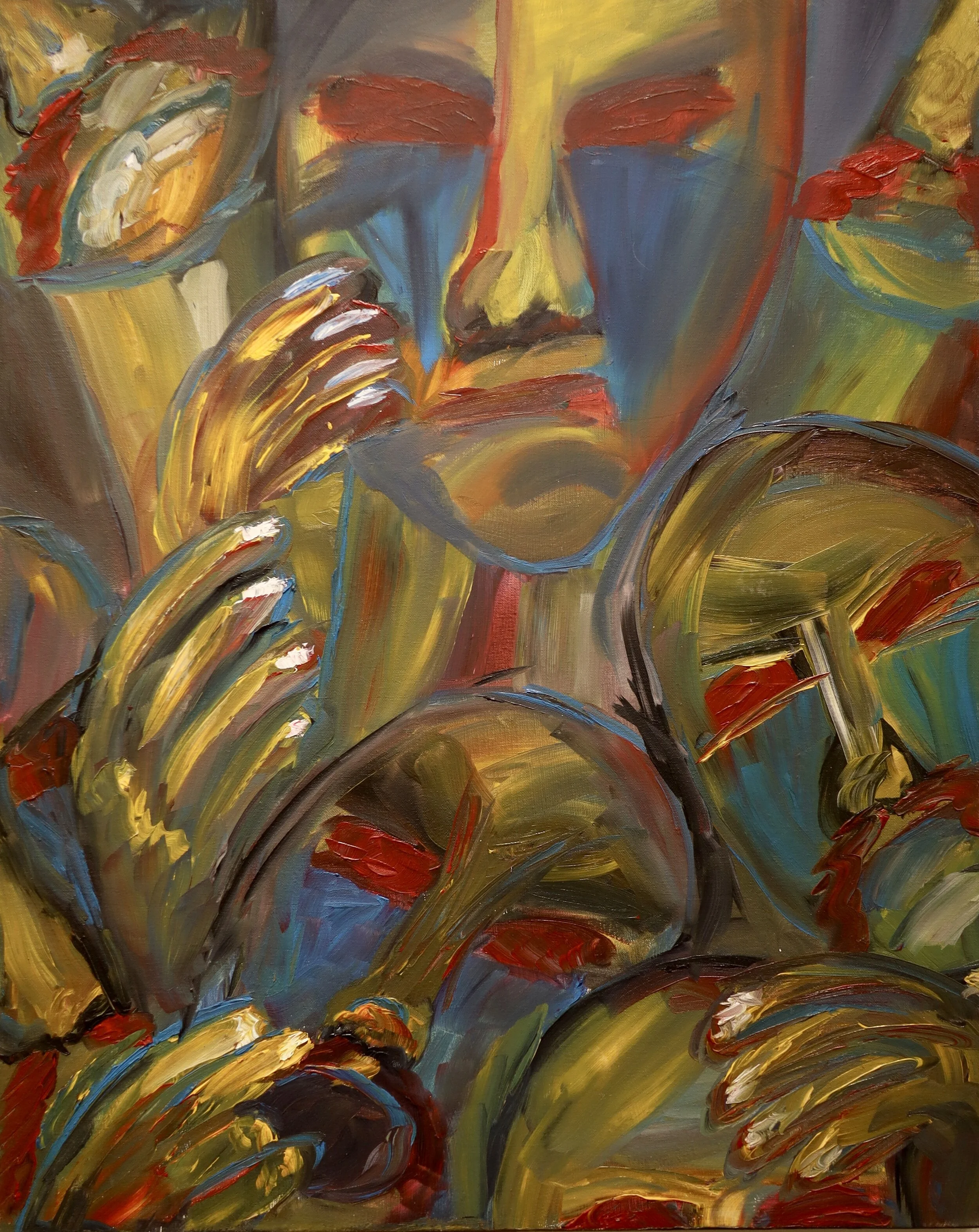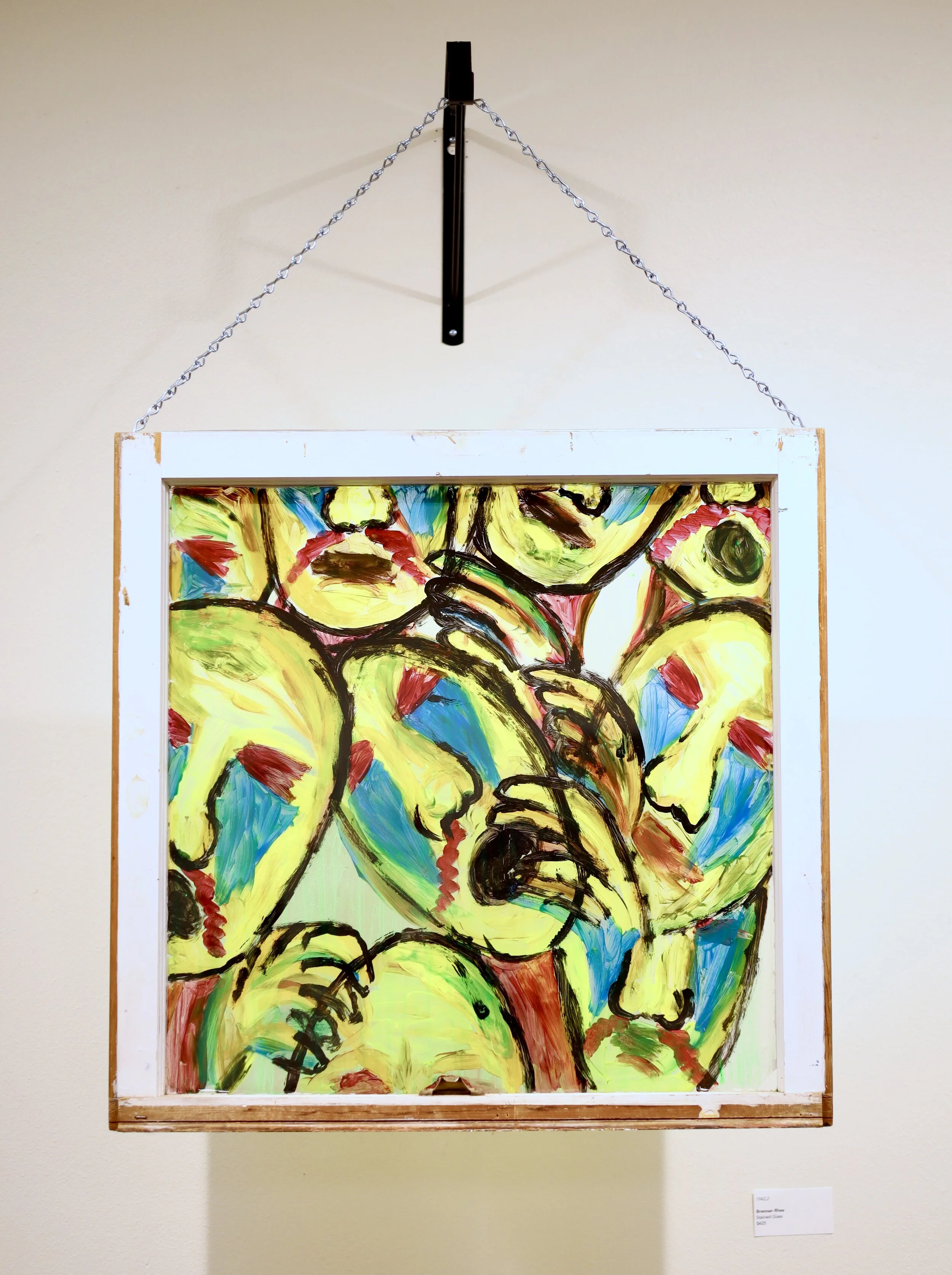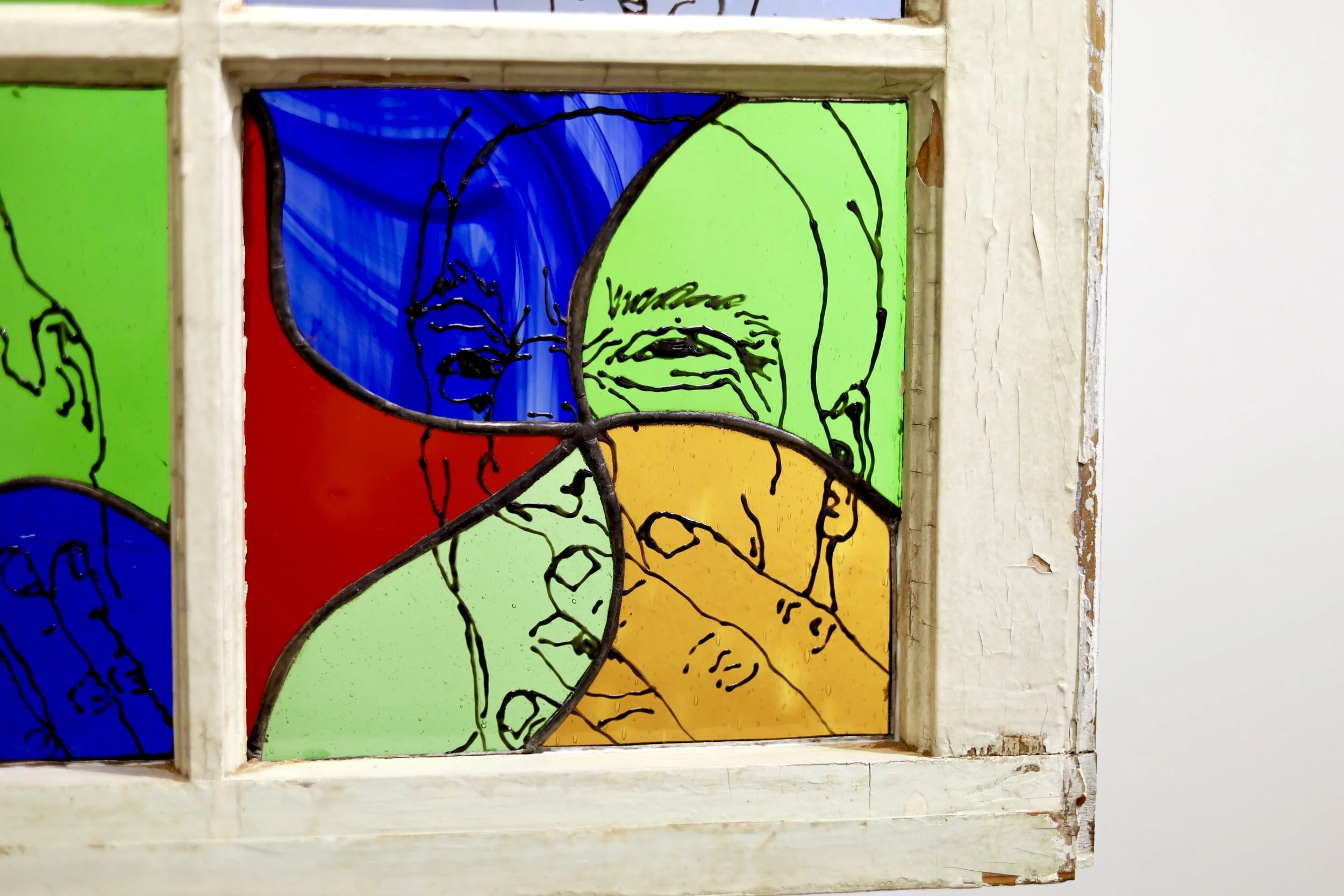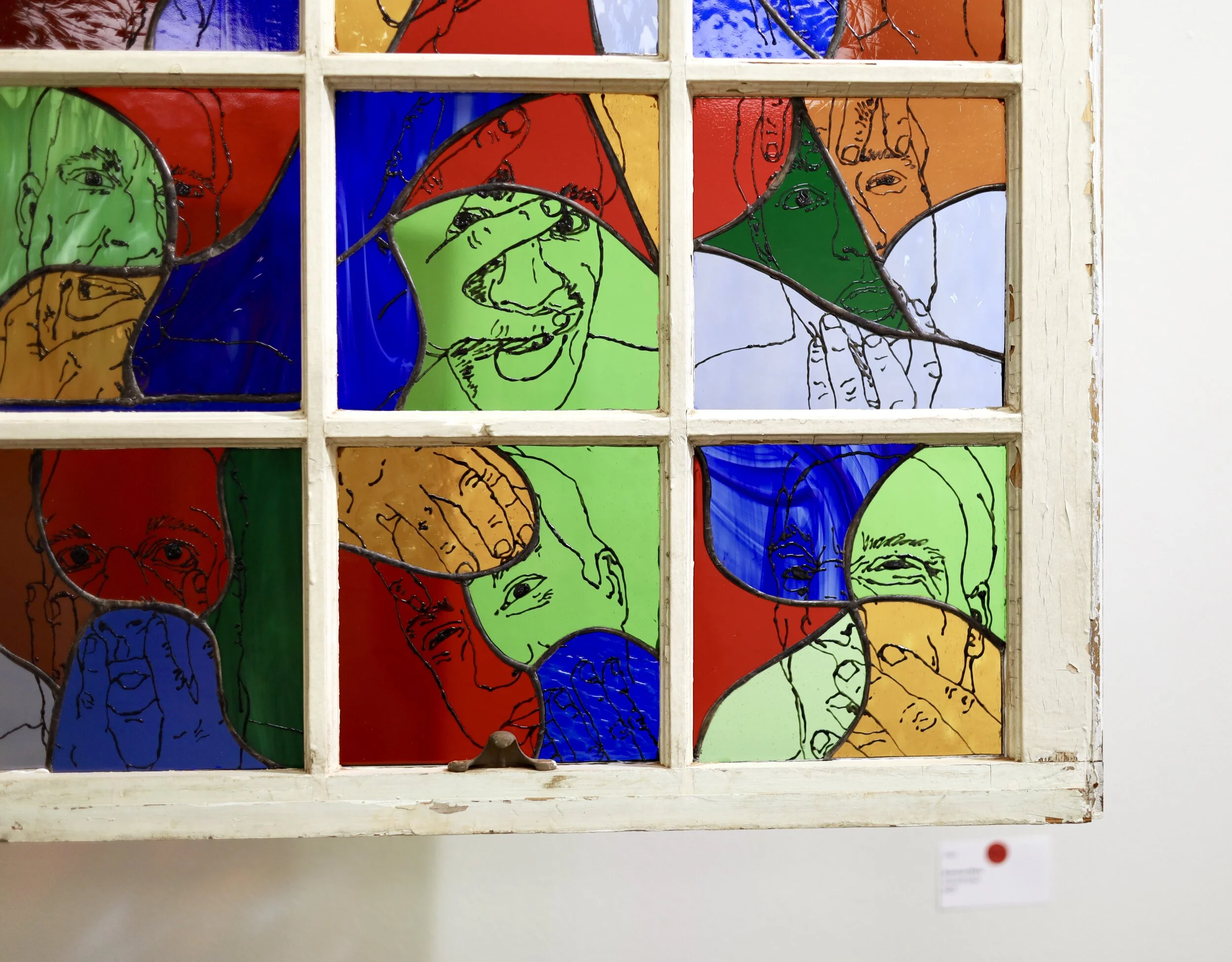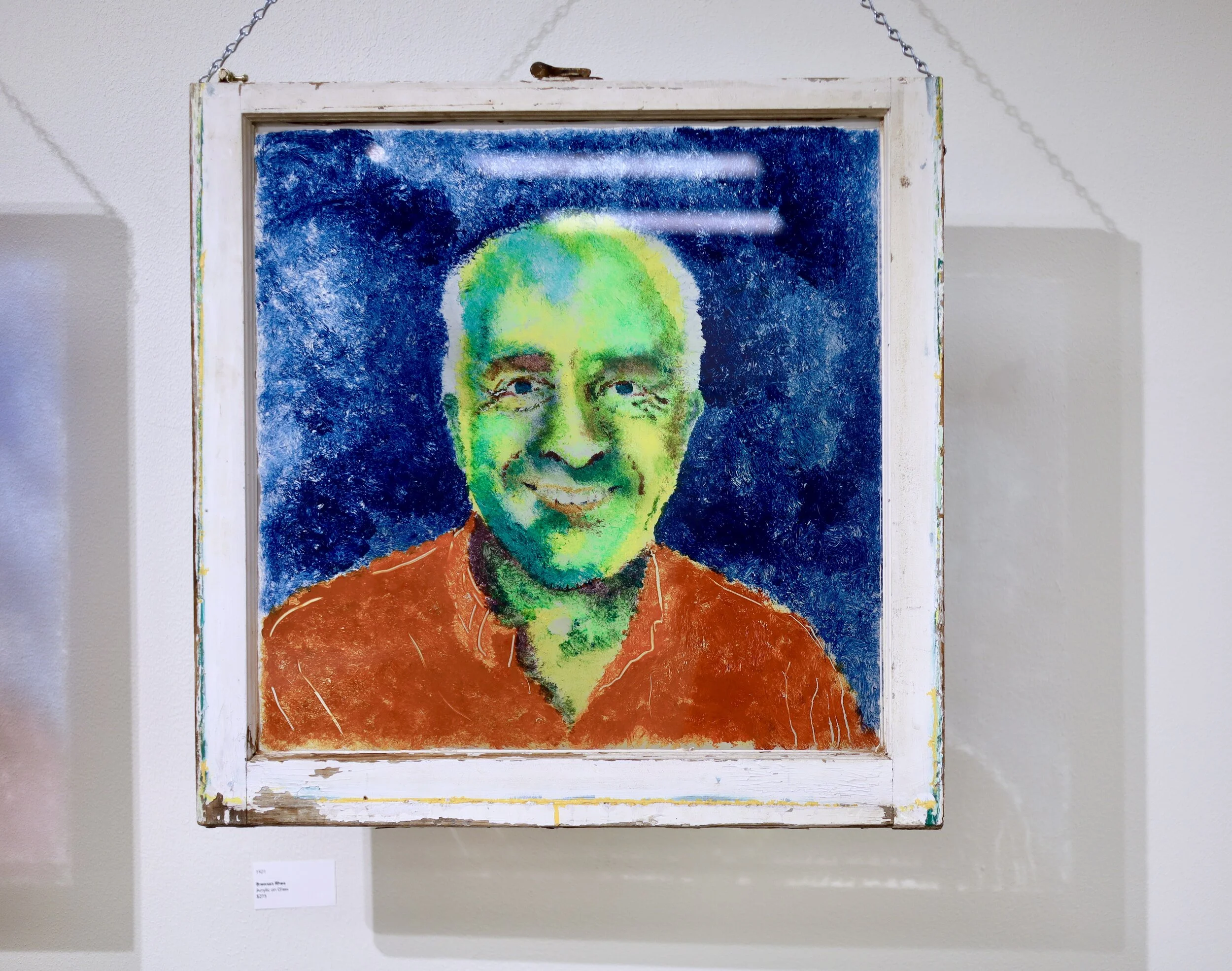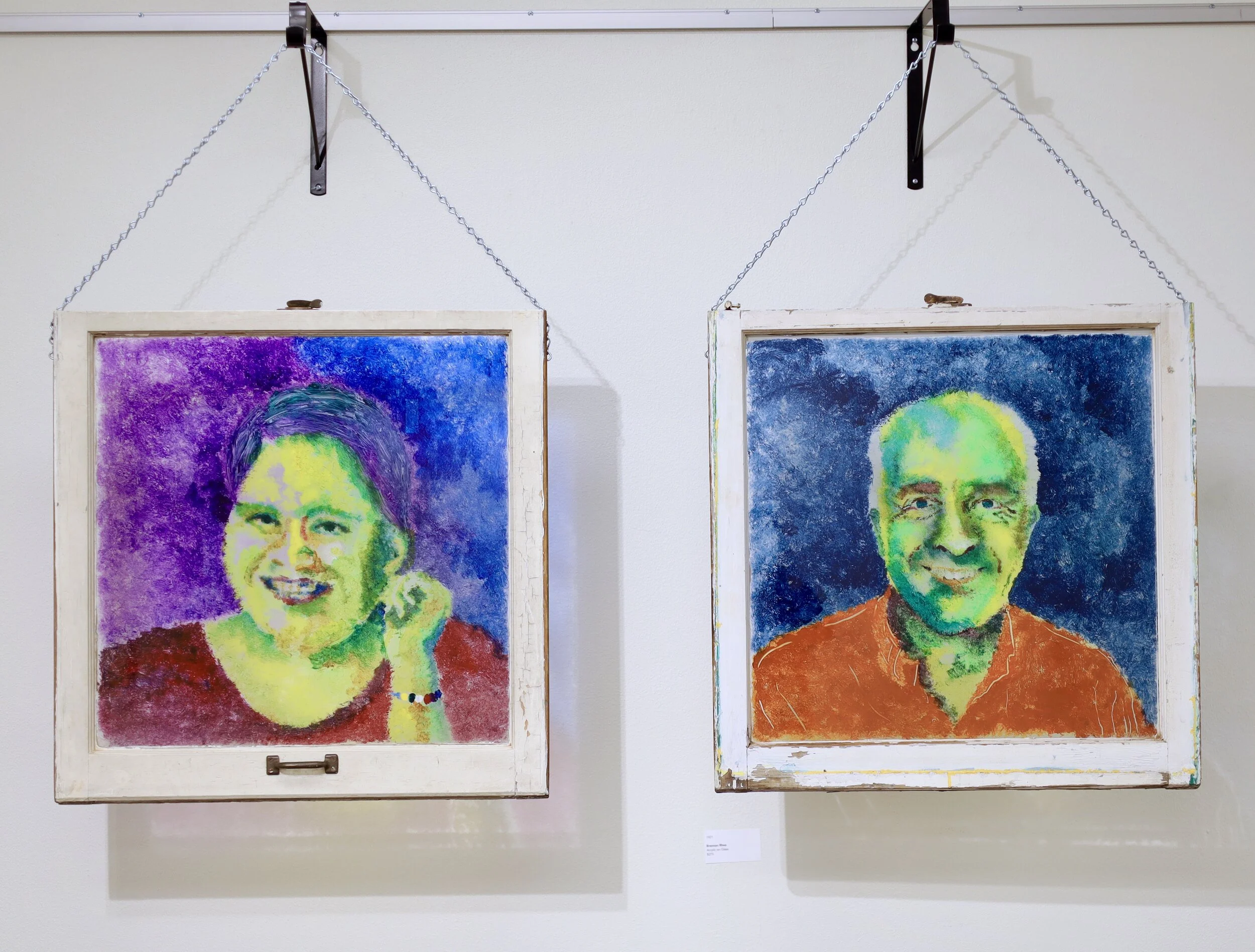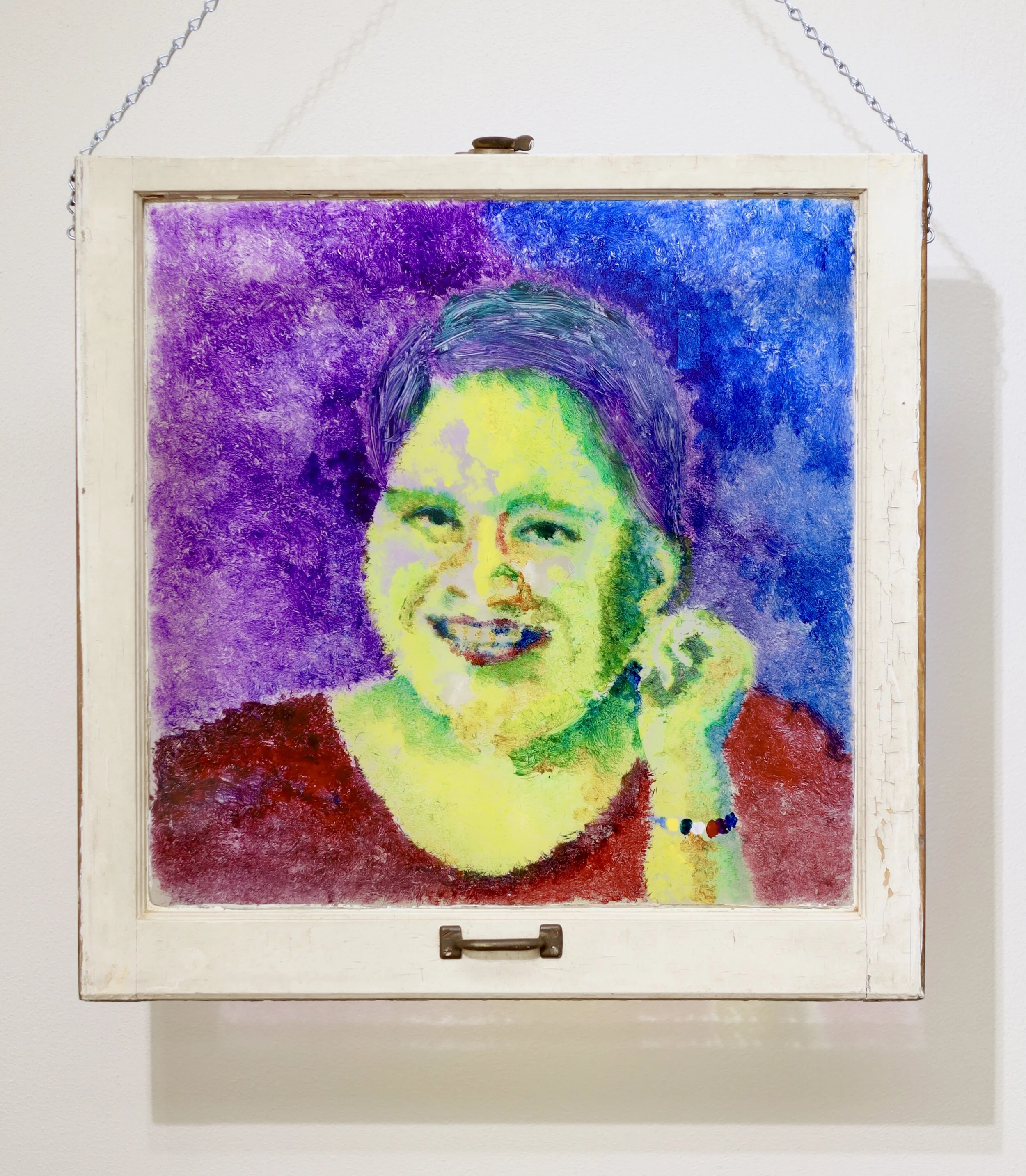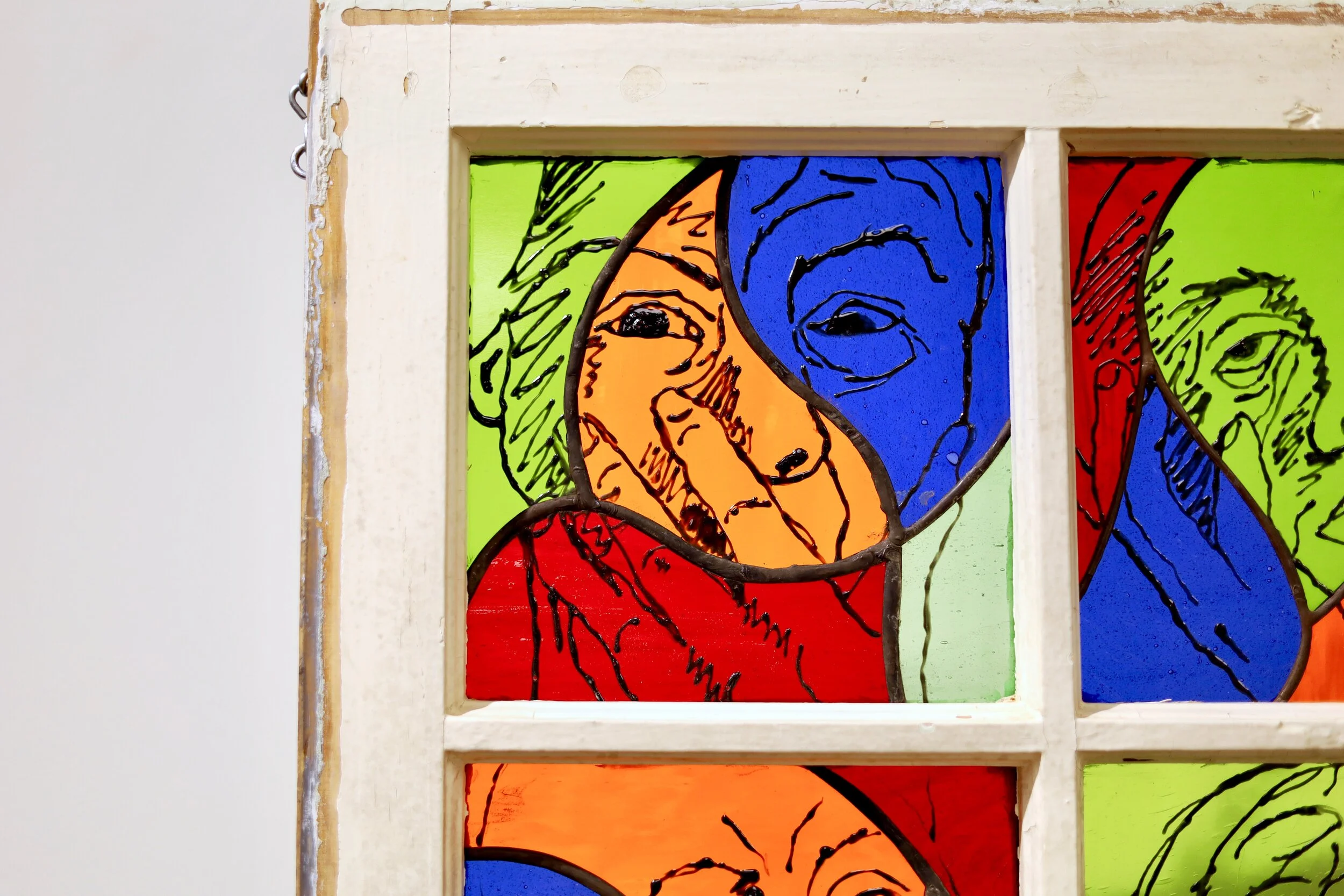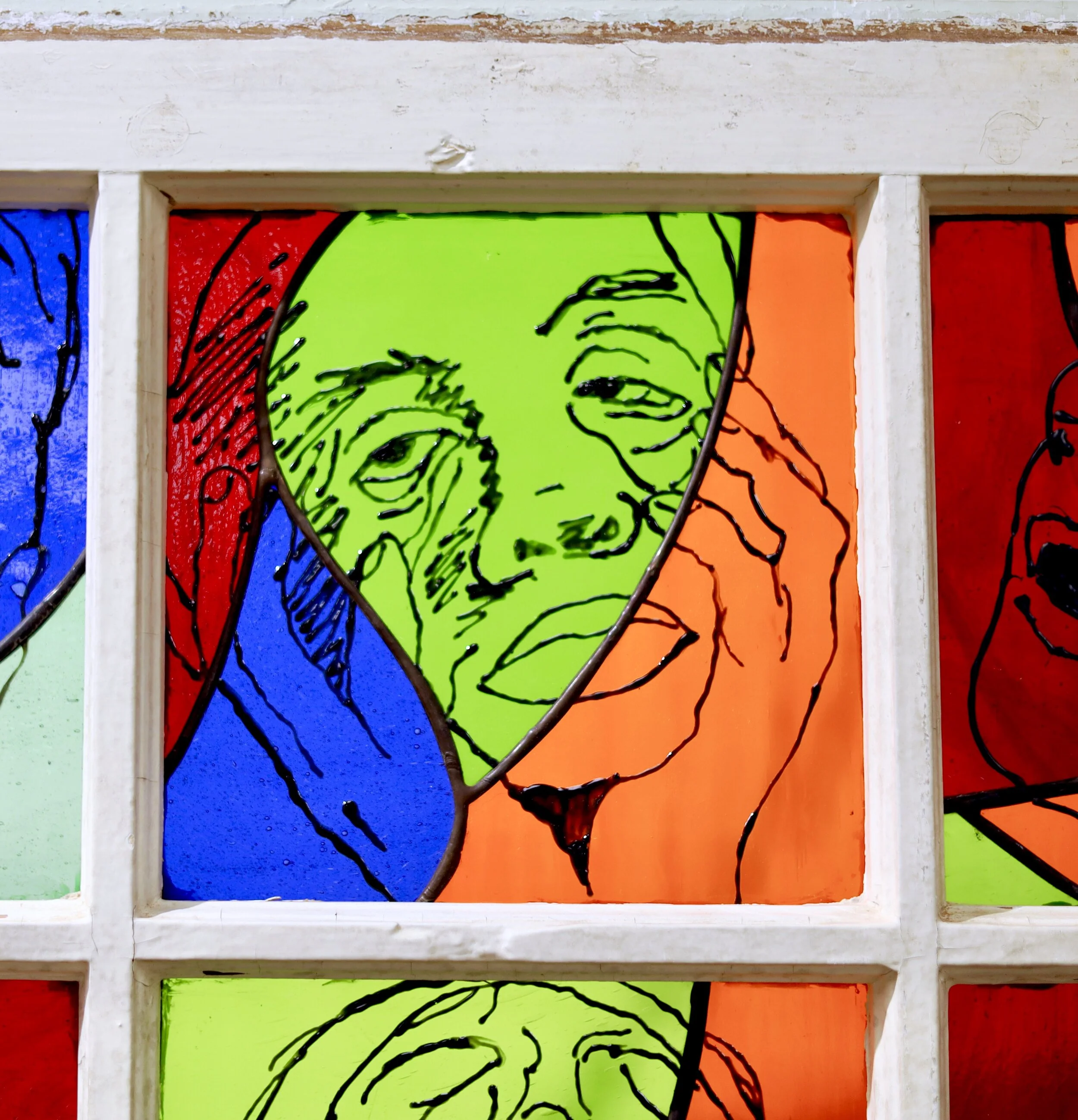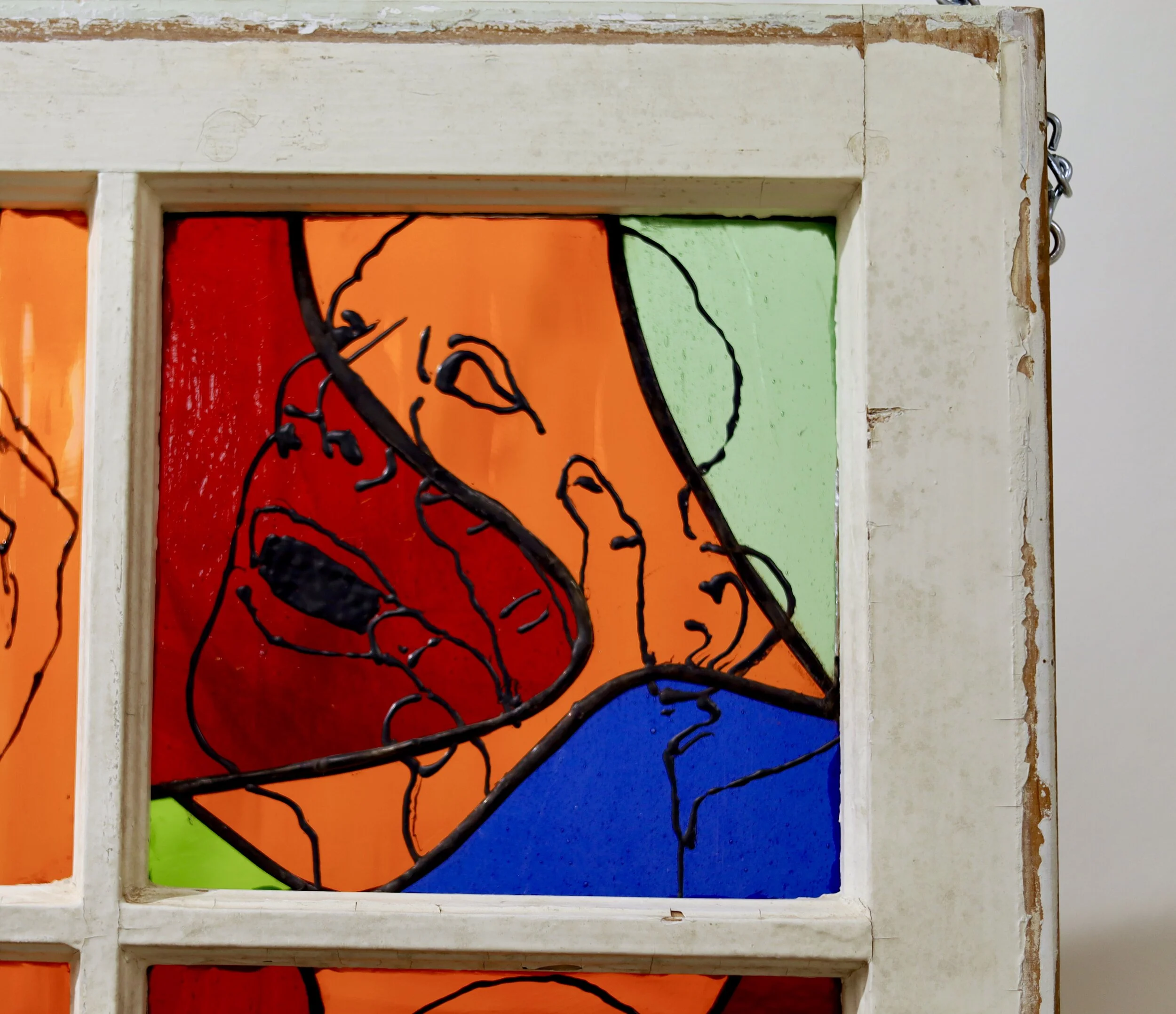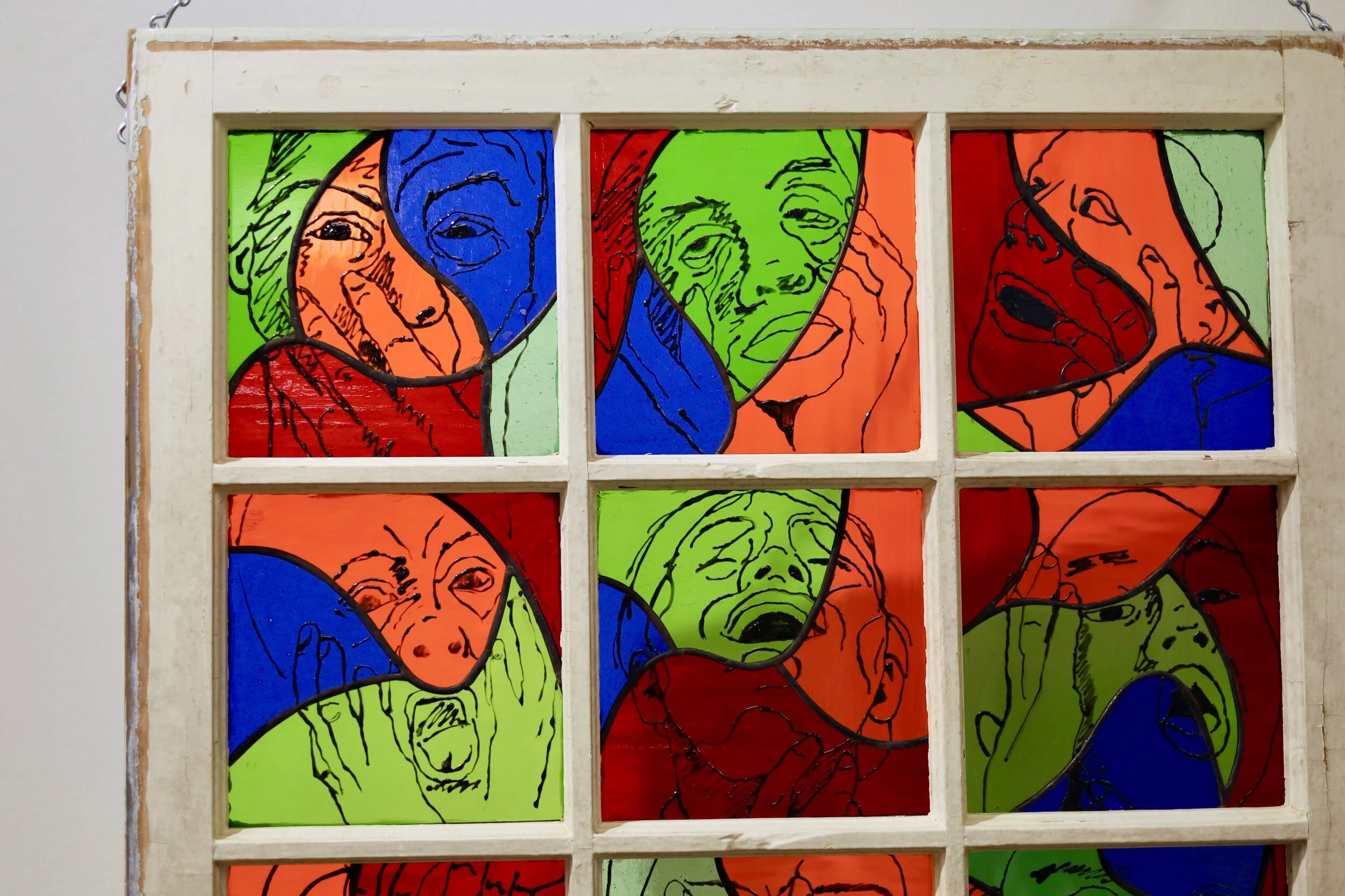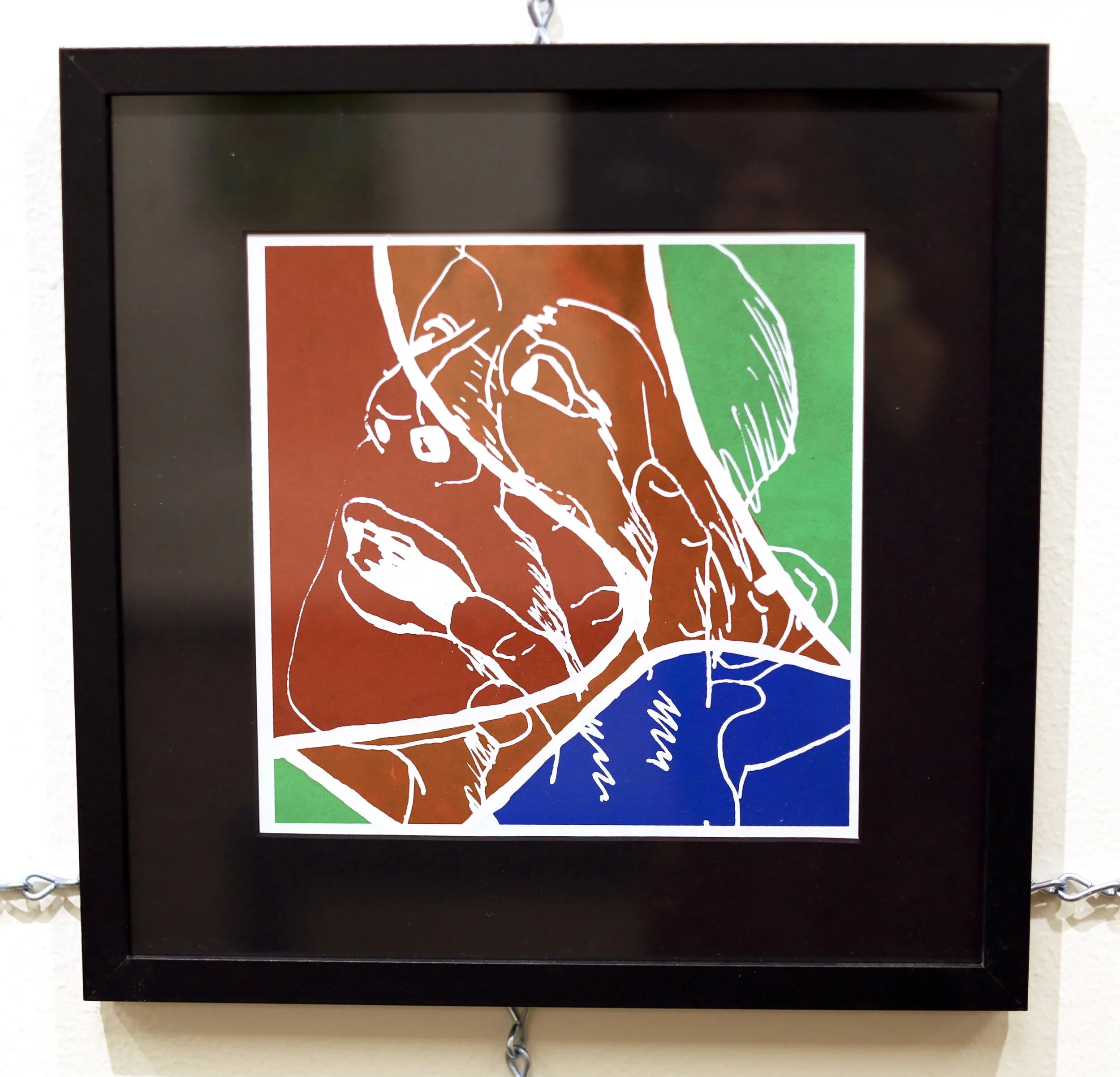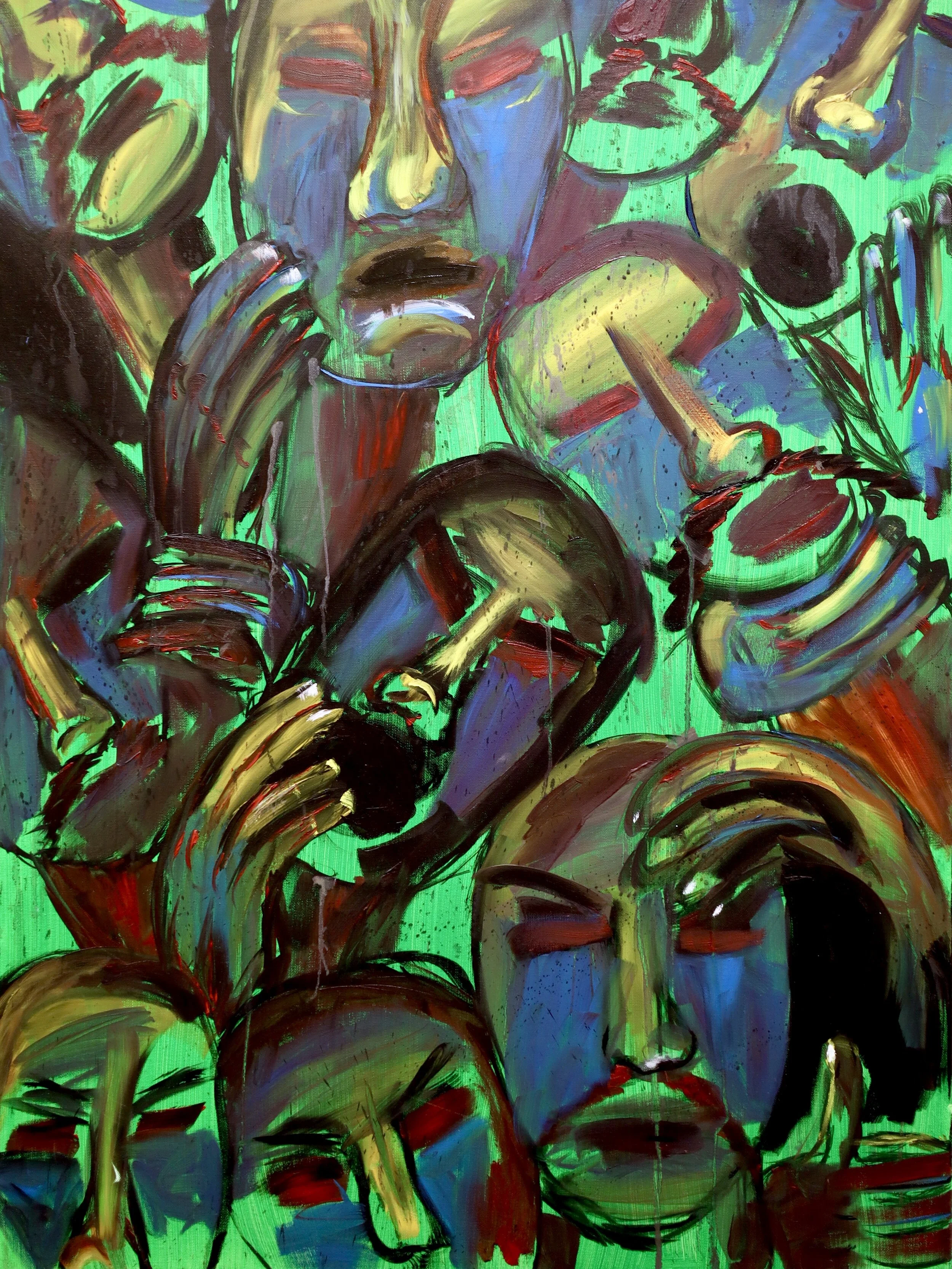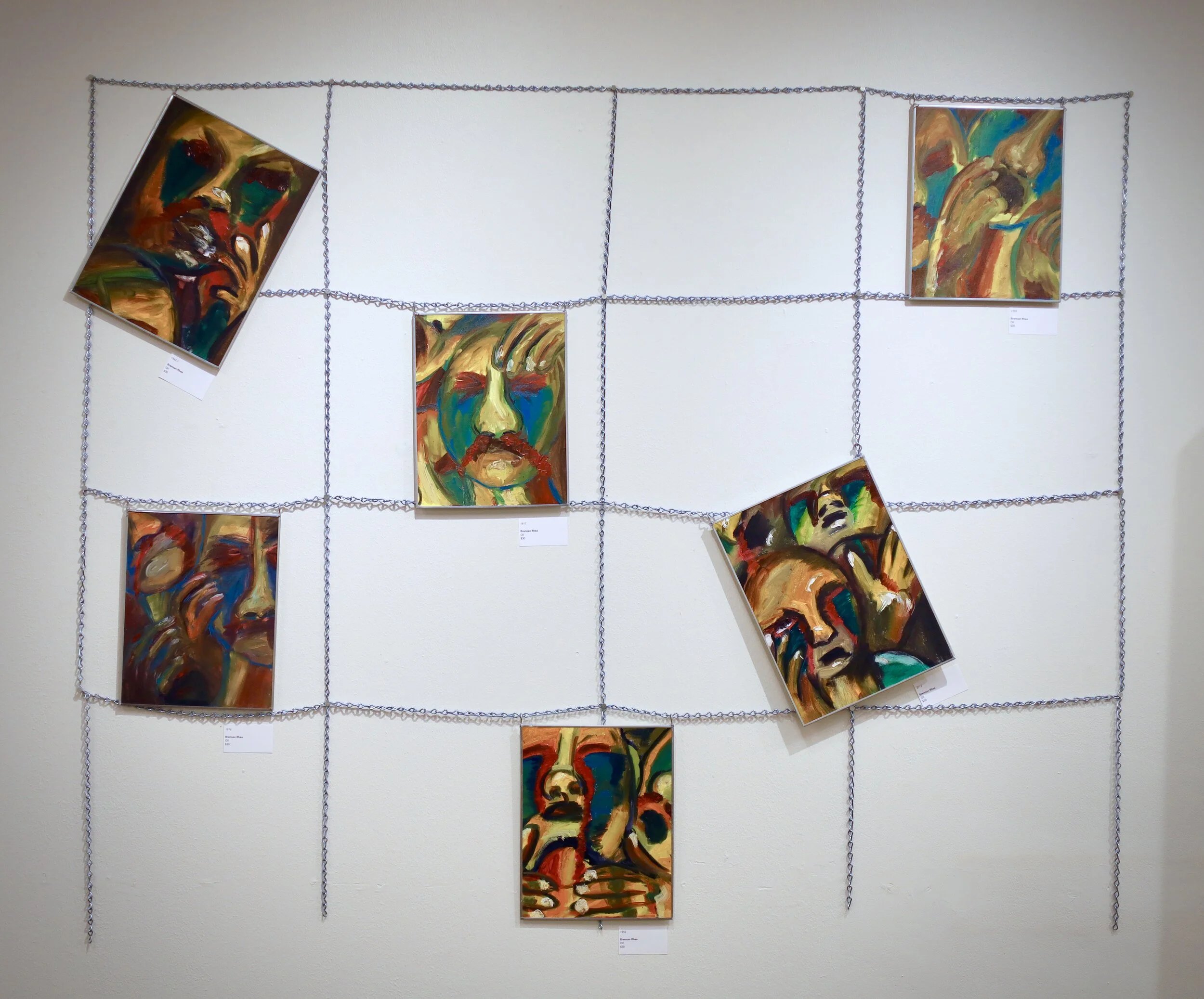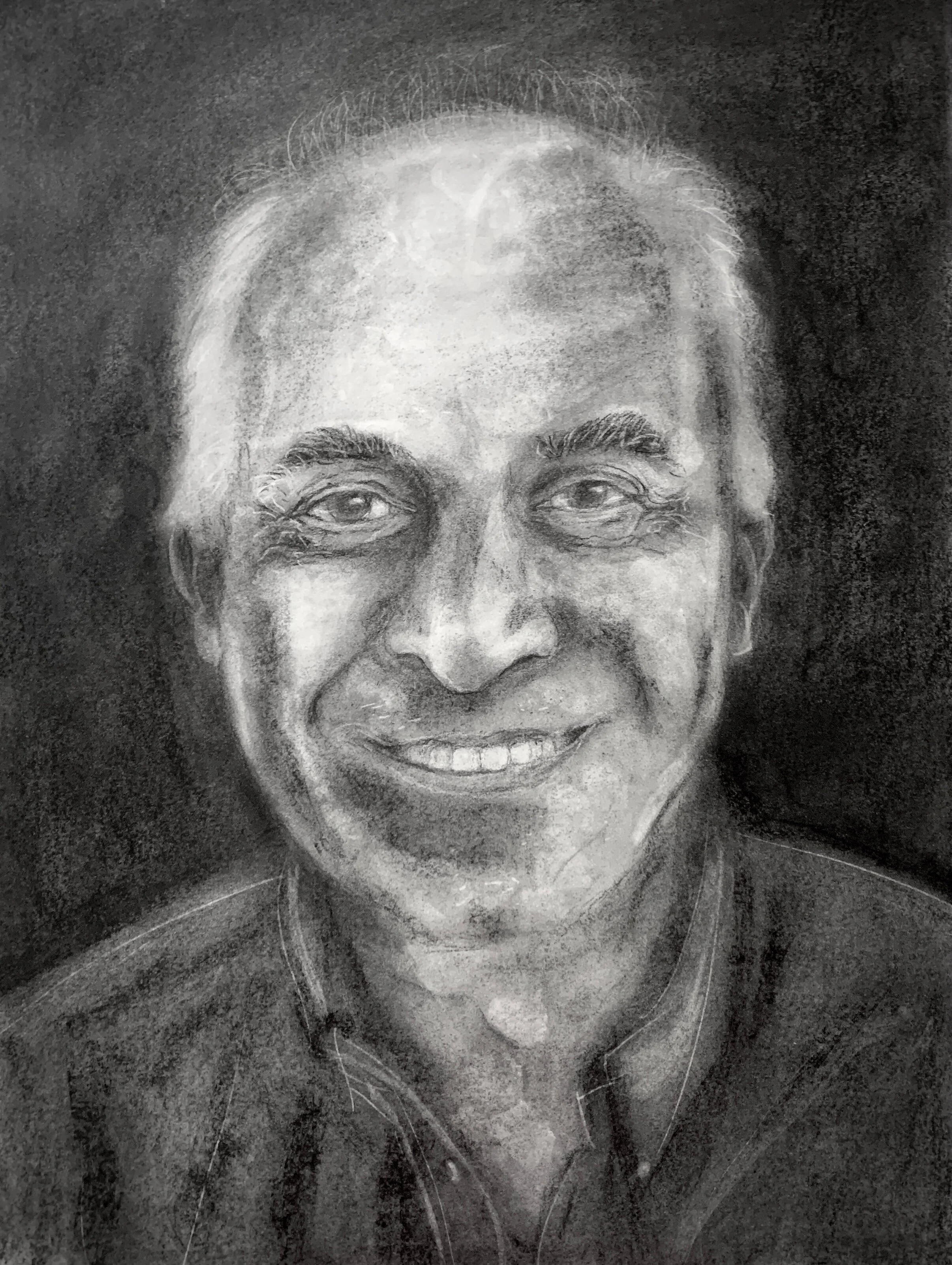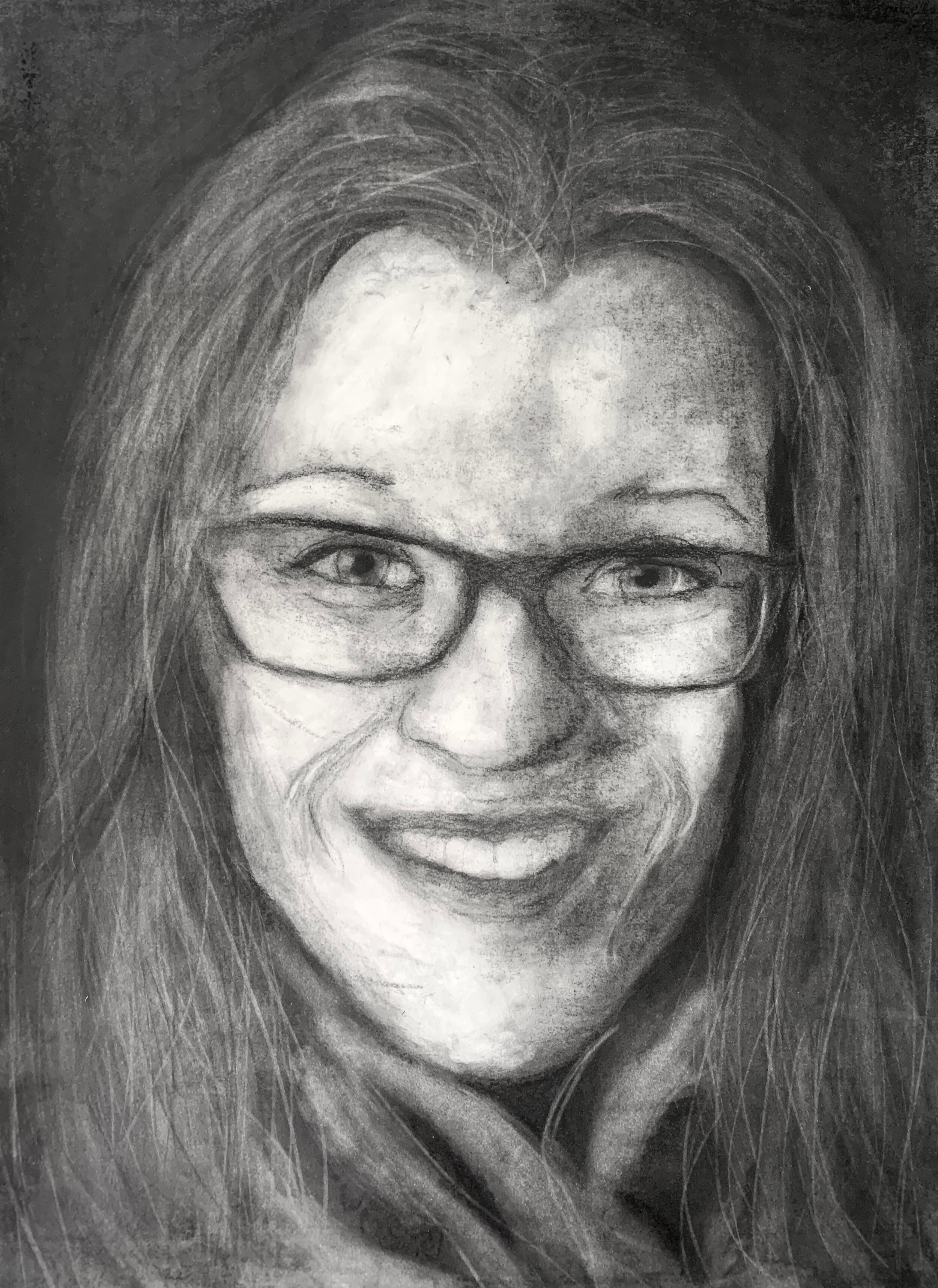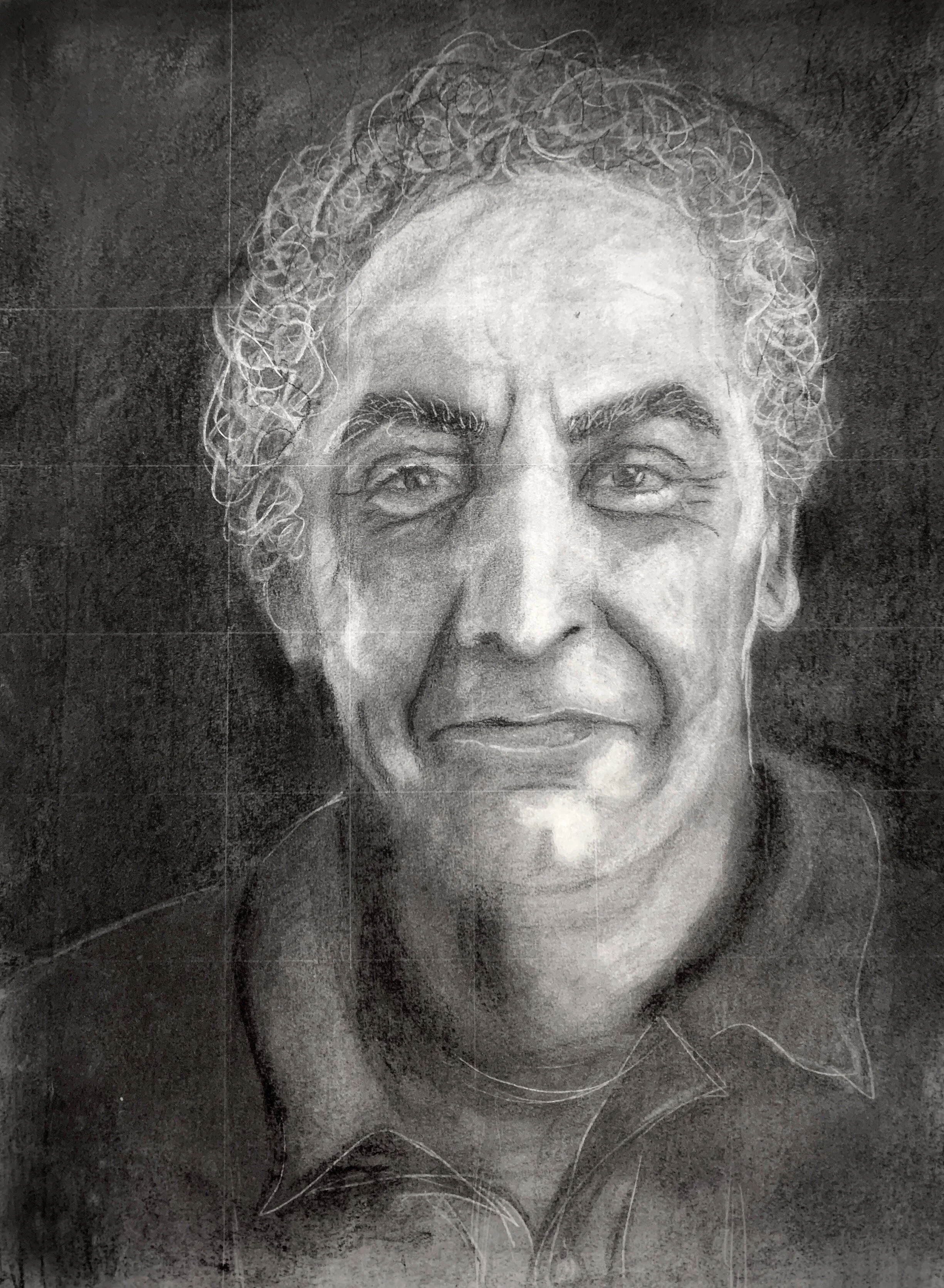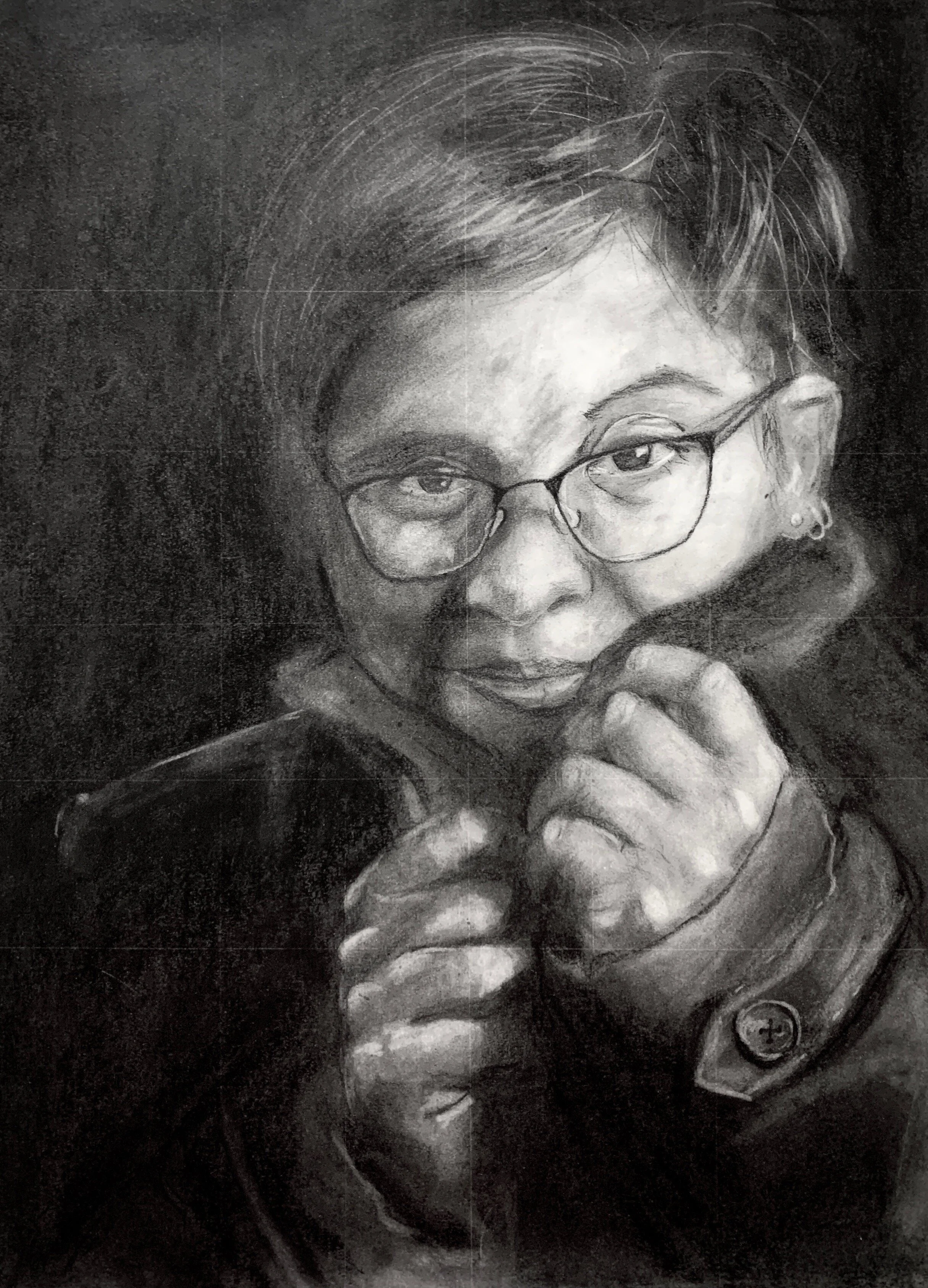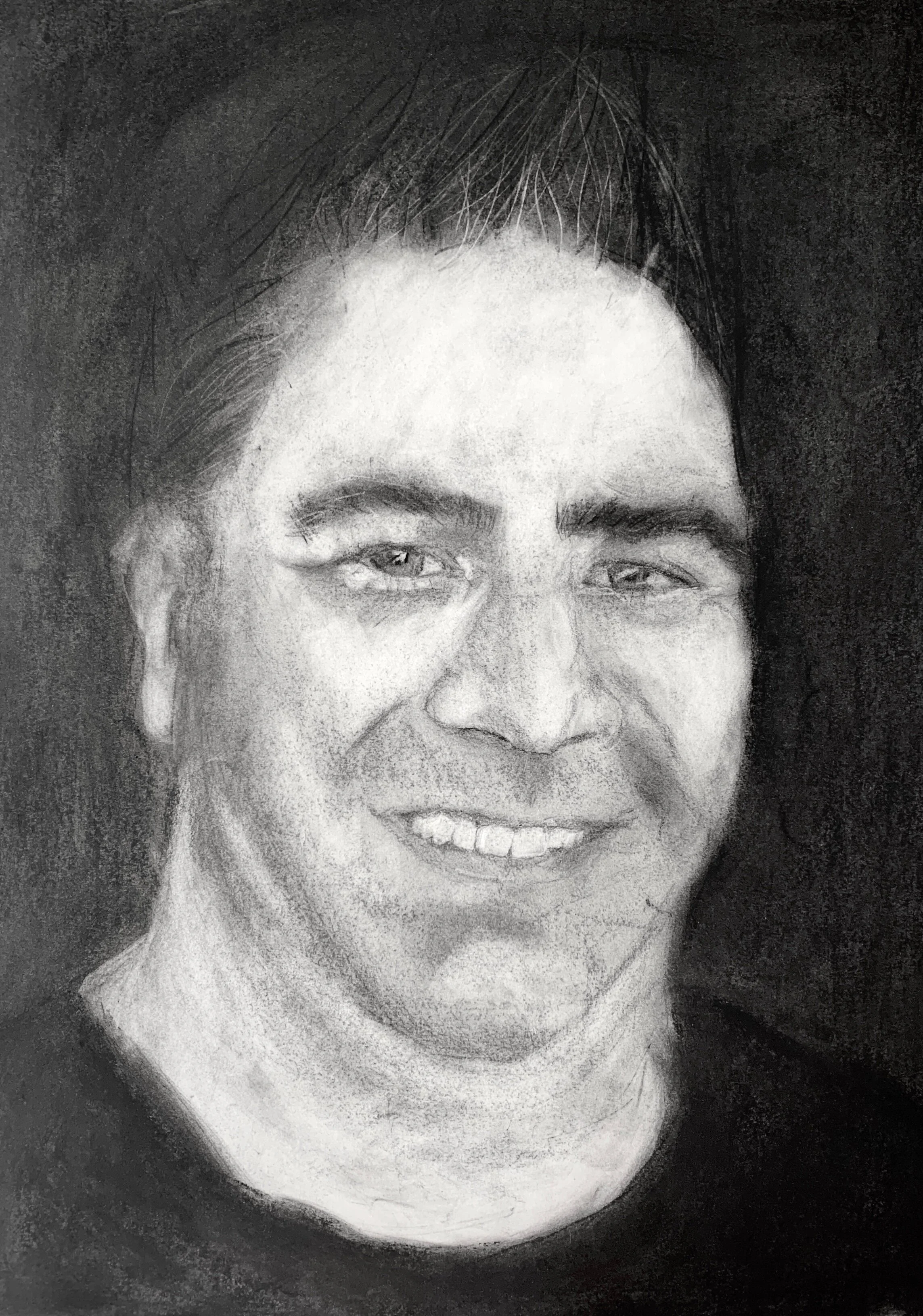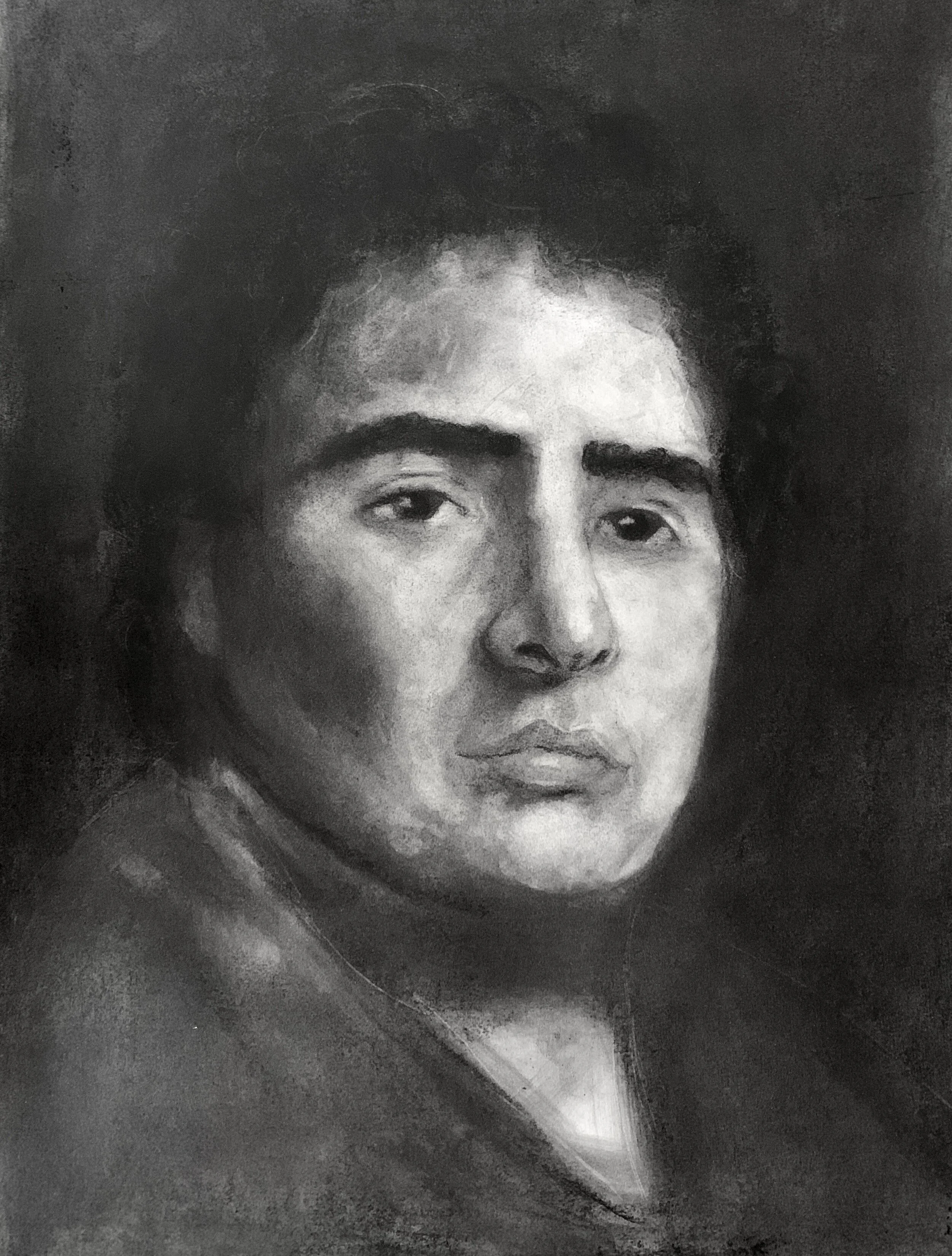Shop the Neighbors Project
See something you can’t live without? Click here to purchase or request a commission!
Oil – $50 • 1891 • "A law signed by President Benjamin Harrison on March 3, 1891 makes it a federal misdemeanor to bring into the United States or aid in bringing into the United States any noncitizen not lawfully entitled to enter. It also establishes the position of a federal superintendent of immigration situated within the Treasury Department. –Migration Policy Institute
Oil–SOLD • 2002.2 • "The Homeland Security Act creates the Department of Homeland Security (DHS). In 2003, nearly all of the functions of the US Immigration and Naturalization Service (INS) — the Department of Justice agency responsible for provision of immigration services, border enforcement, and border inspection — are transferred to DHS and restructured to become three new agencies: US Customs and Border Protection (CBP), US Immigration and Customs Enforcement (ICE), and US Citizenship and Immigration Services (USCIS)." –Migration Policy Institute
Oil–$50 • 2006 • "Congress enacts the Secure Fence Act after the Senate fails to adopt immigration reform legislation that had passed the House in 2005. The law mandates the construction of more than 700 miles of double-reinforced fence to be built along the border with Mexico, through the US states of California, Arizona, New Mexico, and Texas in areas that experience illegal drug trafficking and illegal immigration. It authorizes more lighting, vehicle barriers, and border checkpoints and requires the installation of more advanced equipment, such as sensors, cameras, satellites, and unmanned aerial vehicles, in an attempt to increase control of illegal immigration into the United States." –Migration Policy Institute
Oil –$50 • 1986 • "The Immigration Reform and Control Act (IRCA) provides for a 50 percent increase in border patrol staffing, and imposes sanctions on employers who knowingly hire or recruit unauthorized immigrants. The law also creates two legalization programs. One allows unauthorized aliens who have lived in the United States since 1982 to regularize their status; the other permits people who have worked for at least 90 days in certain agricultural jobs to apply for permanent resident status. Under these programs, roughly 2.7 million people who were then illegally residing in the United States eventually become lawful permanent residents." –Migration Policy Institute
Oil–$50 • 1888 • "The 1888 Scott Act further restricts Chinese immigration by prohibiting lawfully residing Chinese nationals who departed the United States from returning, even when such nationals previously received certificates authorizing their re-admission. The following year, the Supreme Court upholds the constitutionality of the Scott Act in Chae Chan Ping v. United States." –Migration Policy Institute
Oil–$50 • 1996.1 • "The Antiterrorism and Effective Death Penalty Act (AEDPA) adds new crimes to the definition of aggravated felony. AEDPA also establishes the “expedited removal” procedure for arriving non-citizens who border officials suspect of lacking proper entry documents or being engaged in fraud; the procedure is amended later that year by the Illegal Immigration Reform and Immigrant Responsibility Act." –Migration Policy Institute
Oil–$200 • 1994 • "The Violent Crime Control and Law Enforcement Act (VCCLEA) gives the US Attorney General the option to bypass deportation proceedings for certain alien aggravated felons, enhances penalties for alien smuggling and reentry after deportation, and increases appropriations for the Border Patrol." –Migration Policy Institute
Oil–$200 • 1942.2 • "Sixty years after the first Chinese Exclusion Act, the Magnuson Act (57 Stat. 600) repeals the Chinese Exclusion Acts and allows Chinese nationals to become US citizens." –Migration Policy Institute
Framed Original Screen Print–$75 • 1798 • "Congress enacts four laws known collectively as the Alien and Sedition Acts, which contain a number of stringent immigration enforcement provisions. Among other provisions, the laws require that non-citizens have resided in the United States for 14 years prior to naturalization, authorize the President to apprehend, restrain, and remove non-citizens who are citizens or subjects of countries with which the United States is at war, and allows the Executive Branch to deport any non-citizen deemed 'dangerous to the peace and safety of the United States.' Congress eventually repeals the naturalization provisions in 1802 and the other portions of the laws are permitted to expire." –Migration Policy Institute
Framed Original Screen Print–$75 • 2001 • "The USA Patriot Act broadens the terrorism grounds for excluding aliens from entering the United States and increases monitoring of foreign students." –Migration Policy Institute
Framed Original Screen Print–SOLD • 1864 • "The Immigration Act of 1864 establishes the position of the Commissioner of Immigration, who will report to the Secretary of State, and provides that labor contracts made by immigrants outside the United States shall be enforceable in the US courts." –Migration Policy Institute
Framed Original Screen Print–SOLD • 1924 • "The 1924 National Origins Quota Act (known as the Johnson-Reed Act) establishes that quotas will be calculated based on 2 percent of each nationality’s proportion of the foreign-born US population in 1890, as indicated in the 1890 census. The use of the 1890 census to set the quotas is criticized as discriminating against southern and eastern Europeans, who arrived in the United States in greater numbers during the last decade of the 19th century and the first two decades of the 20th century. Students, nationals of Western Hemisphere countries, members of certain professions, and the wives and minor children of US citizens are exempted from the quotas." –Migration Policy Institute
Framed Original Screen Print–SOLD • 1948 • "The Displaced Persons Act of 1948 allows over 200,000 individuals displaced from their homelands by Nazi persecution to immigrate to the United States. The law also states that up to 15,000 individuals residing in the United States as of April 1, 1948 who meet the displaced person definition may adjust their status and become lawful permanent residents. President Truman signs the law “with very great reluctance,” expressing concerns that the law’s requirements will exclude many Jewish refugees." –Migration Policy Institute
Stained Glass–$500 • 1965 • "The 1965 Immigration and Nationality Act (known as the Hart-Cellar Act) abolishes the national-origins quota system and replaces it with a system whereby immigrants are admitted based on their relationship to a US citizen or lawful permanent resident family member or US employer. While caps are placed on the total number of immigrants who may be admitted each year in most family based and employer-based categories, the law provides that there will be no cap on the number of “immediate relatives” (spouses, parents, and minor children) of US citizens admitted each year. Like immediate relatives, immigrants from the Western Hemisphere countries are also exempted from the law’s system of “preference categories” for those who are admitted. However, the law provides that beginning in 1968, there will be a cap of 120,000 on the total number of permanent residents who may be admitted from the Western Hemisphere." –Migration Policy Institute
Oil–$250 • 2005 • "The REAL ID Act establishes statutory guidelines for removal cases, expands the terrorism-related grounds for inadmissibility and deportation, includes measures to improve border infrastructure, and requires states to verify an applicant’s legal status before issuing a driver’s license or personal identification card that may be accepted for any federal purpose. (States’ protests persuade Congress to delay implementation of the drivers’ license provisions of the law.) It also bars the use of habeas corpus as a vehicle for challenging removal orders, thus virtually completing the concentration of judicial review in the courts of appeals." –Migrant Policy Institute
Acrylic–$275 • 1921 • "The 1921 Emergency Quota Act constitutes Congress’ first attempt to regulate immigration by setting admission “quotas” based on nationality. The law limits the number of immigrants of each nationality allowed to immigrate to the United States each year to 3 percent of the number of foreign-born persons of that nationality present in the United States as of the 1910 census. Temporary visitors, government officials, and nationals of Western Hemisphere countries are excluded from the quotas." –Migration Policy Institute
Acrylic–$275 • 1975 • "The 1975 Indochina Migration and Refugee Assistance Act (89 Stat. 87) expands the definition of the term “refugee,” as defined in the Migration and Refugee Assistance Act of 1962, to include individuals fleeing persecution or fear of persecution from Cambodia and Vietnam." –Migration Policy Institute
Original Screen Prints, Limited Edition–$35
Stained Glass–SOLD • 1980 • "The Refugee Act of 1980 (94 Stat. 102) establishes a new statutory system for processing and admitting refugees from overseas as well as asylum seekers physically present at US borders or in the country. The law defines a “refugee” as any person outside the person’s country of nationality who is unable or unwilling to return to that country because of persecution or a well-founded fear of persecution on account of race, religion, nationality, membership in a particular social group, or particular opinion." –Migration Policy Institute
Framed Original Screen Print–SOLD • 1962 • "President John F. Kennedy signs the Migration and Refugee Assistance Act of 1962, which authorizes funds to assist foreign nationals from the Western Hemisphere who have fled their countries of origin because of persecution or a fear of persecution on account of race, religion, or political opinion. The law is intended to assist Cuban nationals fleeing Communism." –Migration Policy Institute
Framed Original Screen Print–SOLD • 1790 • "The 1790 Naturalization Act establishes the country’s first uniform rule for naturalization. The law provides that “free white persons” who have resided in the United States for at least two years may be granted citizenship, so long as they demonstrate good moral character and swear allegiance to the Constitution. The law also provides that the children (under 21) of naturalized citizens shall also become US citizens." –Migration Policy Institute
Framed Original Screen Print–$75 • 2016-2020 • "Now well into its fourth year, the administration has undertaken more than 400 executive actions on immigration, spanning everything from border and interior enforcement, to refugee resettlement and the asylum system, Deferred Action for Childhood Arrivals (DACA), the immigration courts, and vetting and visa processes. This report offers a comprehensive catalog, by topic, of those actions, including their dates and the underlying source materials." –Migration Policy Institute READ MORE AT https://www.migrationpolicy.org/research/us-immigration-system-changes-trump-presidency
Framed Original Screen Print–$75 • 1882 • "Congress enacts the Immigration Act of 1882, constituting one the first attempts at broad federal oversight of immigration. The law levies a tax of 50 cents for each passenger arriving by ship from a foreign port who is not a US citizen, to be paid by the ship’s owner. The proceeds are deposited into a fund in the US Treasury called the “immigration fund,” which the Treasury Secretary is authorized to use to defray expenses incurred in regulating immigration. The law further establishes that the United States will screen arriving passengers and that anyone deemed a “convict, lunatic, idiot, or person unable to take care of himself or herself without becoming a public charge” shall not be allowed to land." –Migration Policy Institute
Framed Original Screen Print–$75 • 1945 • "The War Brides Act authorizes the admission of the foreign-born spouses and children of US citizens serving in or honorably discharged from the armed forces during World War II." –Migration Policy Institute
Acrylic and Screen Print–SOLD • 2010 • "Development, Relief, and Education for Alien Minors Act of 2010 or DREAM Act of 2010 - Authorizes the Secretary of Homeland Security (DHS) to cancel the removal of, and adjust to conditional nonimmigrant status, an alien who: (1) entered the United States before his or her 16th birthday and has been present in the United States for at least five years immediately preceding this Act's enactment; (2) is a person of good moral character; (3) is not inadmissible or deportable under specified grounds of the Immigration and Nationality Act; (4) has not participated in the persecution of any person on account of race, religion, nationality, membership in a particular social group, or political opinion; (5) has not been convicted of certain offenses under federal or state law; (6) has been admitted to an institution of higher education (IHE) or has earned a high school diploma or general education development certificate in the United States; (7) has never been under a final order of exclusion, deportation, or removal unless the alien has remained in the United States under color of law after such order's issuance, or received the order before attaining the age of 16; and (8) was under age 30 on the date of this Act's enactment." –Congress.gov
Oil–$250 • 1990 • "The 1990 Immigration Act raises legal admissions to 50 percent above the pre-IRCA level (mainly in the category of employment-based immigrants), eases controls on temporary workers, and limits the government’s power to deport immigrants for ideological reasons. It also expands the scope of aggravated felony to include nonpolitical crimes of violence for which a prison sentence of at least five years was imposed, while eliminating important discretionary relief for certain aggravated felons. The act also abolishes judicial recommendations against deportation, thus terminating the discretion of sentencing judges to grant relief from deportation for criminal offenders." –Migration Policy Institute
Oil–$50 • 1976 • "The Immigration and Nationality Act Amendments of 1976 adopts the 1965 Immigration and Nationality Act’s system of immigration “preference categories” for immigrants from Western Hemisphere countries. " –Migrant Policy Institute
Oil–$50 • 1942.1 • "Prompted by labor shortages in the United States as a result of World War II, the United States and Mexico enter into the 1942 Bracero Agreement, allowing Mexican nationals to enter the United States to serve as temporary agricultural workers. The agreement, which Congress extended in 1949 and 1951, provides that US employers will pay the transportation and living expenses of Mexican laborers, as well as wages equal to those of American farmworkers doing similar work. The program continues in some form until 1964." –Migrant Policy Institute
Oil–$50 • 1917 • "The 1917 Immigration Act (39 Stat. 874) draws on the prohibitions of the Chinese exclusion laws and creates an “Asiatic barred zone” covering British India, most of Southeast Asia, and almost all of the Middle East. Nationals from countries within the zone are prohibited from immigrating, though the law exempts students, as well as certain professionals (e.g. teachers, government officers, lawyers, physicians, and chemists), and their wives and children. The law also expands the list of grounds of inadmissibility to include, among other grounds, anarchists, persons previously deported who seek re-entry within a year without obtaining special permission, and all individuals over the age of 16 who are deemed “physically capable of reading” and who cannot read." –Migrant Policy Institute
Oil–$50 • 1952 • "The Immigration and Nationality Act (known as the McCarren-Walter Act) consolidates several immigration laws into one statute, and preserves the national origins quota system (though the law updates the way in which the quota is calculated). For the first time, Asian nations are assigned quotas that allow their nationals to immigrate to the United States. The new law also establishes that US consular officers will screen foreign nationals for admissibility to the United States, and that officers will not issue visas to individuals found inadmissible." –Migrantion Policy Institute
Oil–$50 • 1997 • "The Nicaraguan Adjustment and Central American Relief Act (NACARA) provides several avenues for relief from deportation and adjustment of status for qualified Nicaraguans, Cubans, Salvadorans, Guatemalans, and nationals of former Soviet-bloc countries." –Migrantion Policy Institute
Oil–$50 • 1998 • "The Haitian Refugee Immigration Fairness Act (HRIFA) provides similar benefits to qualified Haitian nationals as did The Nicaraguan Adjustment and Central American Relief Act (NACARA)." –Migrantion Policy Institute
Discover the Stories of Six Immigrants Below
Click here to commission a Portrait!
Iran - United States
Farajollah "Jeff" Ghandnoosh
I was born in Iran and came to the United States to attend college. While here I studied English and worked at Beverly’s Restaurant at NW 23rd and Classen. Following graduation, I continued to work at Beverly’s and eventually bought it from Doris Ballard in January of 1991. Later that year I changed the name to Jeff’s Country Kitchen, serving OKC great food until I sold the property to Walgreens. After the sale, I relocated the restaurant to NW 33rd and Classen. We were ready to serve on July 4th, 2004 and celebrated our 30th year of restaurant service this January.
I met my wife through my sisters. They told me about her, and 1 decided to call her. We had a long-distance relationship for about two months. The calls cost $1 a minute and we talked every day. I decided, rather comically, that it would be more cost efficient to travel back to Iran and marry my sweet wife. I made the trek to Iran and two months later we were married. Upon returning to Oklahoma City, we created a life of love, hard work, and family. We have one daughter, and I am proud to say is very well educated. She is currently in process of becoming a doctor.
I was asked about having connection to family back home, Yes, I have millions of family members in Iran, and they are all suffering. The extremists and wars have destroyed the once beautiful city that was my home. I appreciate the opportunity of living in America and have created a wonderful and quite successful life here in Oklahoma but my heart breaks for the unrest in my homeland.
The Netherlands - United States
Leanne
I almost feel guilty for not having that story or experience that Americans seem to think is typical of an “immigrant.” The one in which the immigrant left a country because of violence, poverty, or persecution, in search of a dream, a new life in the US. A success story, yet marked by the struggle of integration and fitting in. I often feel like I have little in common with other immigrants. As a white woman from a NATO country, speaking English fluently and without an accent, integration went fairly seamlessly. But I think the real reason is that I never immigrated on purpose. I was only going to stay a little while. I came to the US in 2000 on a student visa to go to Bible college. My intent was to graduate college, go home, and join a mission organization. But I met my Air Force Husband, married after my graduation, and never went back. Finances, life circumstances, a booming real estate market, and no job opportunities for him, have made it an unattainable dream still to return to the Netherlands. I am 39 years old and have now been in the US for over 20 years. Every time I think about that – and how that is more than half of my life – I tear up and a feeling of anxiety and desperation rises up in my chest to the point I can physically feel it. The longer I am here and the older my children get, the smaller my chances of ever returning home. It’s a thought that plays in my head daily.
The grass is always greener on the other side and maybe I am just glorifying the past or culture I probable no longer fit in because it has changed too much over the last 20 years, and I’ve probably changed even more. I’ve become so Americanized, people don’t even know I am an immigrant unless I tell them. Maybe that deep longing that I feel is what CS Lewis referred to when he wrote, “If I find in myself desires which nothing in this world can satisfy, the only logical explanation is that I was made for another world.”
It’s not that I hate it here (although there are certainly some aspects of society and culture that I could do without). I live here, this is my community too. I uphold the Constitution because I believe it’s valuable and good. As a naturalized citizen I vote in ways I believe will make my community, state, and this country a better place for all people. I will never get enough of America the Beautiful: its incredibly diverse geographical features, from the big sky over vast prairies to the woods, mountains, and canyons, there is so much more to discover.
But every day, I am in one way or another confronted with what I am missing back home. Sometimes I don’t even want to check my phone for pictures of nieces and nephews, or a conversation with my mom, because it is literally physically painful. A deep, longing ache for them, for my culture, that I can’t begin to describe. It’s like a sinking feeling in my chest, a heaviness and contracting of the sternum and upper abdomen. It’s the weirdest thing. I feel stuck sometimes. Stuck between my home here, stuck between my home there. And I think I will always be. As much as I don’t want it to be because it makes me feel somewhat like a traitor, this is home too. It is here in the US where I “adulted” and spent most of my cognitive and formative years. But the Netherlands is home-home. My family is there, my history, my culture, my friends, my roots. The ache for that home is deep and relentless. Over the years, particularly during the first 8 years or so, I would always waver back and forth. I would feel at home here, thinking I could never go back. In college, when I would visit the NL, I missed my life in Chicago and wanted to go back. But as the years went on, when my children were born, when I realized they would grow up without close involvement or proximity to grandparents and that I was on my own, it became harder. When I realized they wouldn’t grow up the way I did, know that part of their heritage intimately, it stung. And a level of homesickness crept in that over the years has only grown more intense.
I don’t want to be the lone person in the family tree who “immigrated” and started a new life, because that wasn’t my intent, but more so, it makes me feel lonely, and as if my family and culture were not good enough. And I am pretty sure my family has given up on holding on to the notion that one day we’d move back. I feel guilty about smashing my parents’ hopes.
Morocco - United States
I immigrated from Morocco to the United states in 1983 on an education visa. When I arrived in the States I only spoke French so for the first six months of living in the United States I went to English as a Second language training which cost three thousand dollars a month. It was at these ESL classes where I met my wife which caused me to like Oklahoma a little more. I started working at a local restaurant during my time in ESL and continued through college. Beginning as a dishwasher, I later transitioned into a mangers position and then eventually purchased the business and went on to expand to multiple locations. My wife was working on her Master’s degree when we met and our wo sons both have college educations and are doing very well. I still has very good relationships with his brothers and sisters both in the United States and Morocco.
I appreciate the system I came under when I immigrated but that tensions regarding immigrants rose after the implementation of the lottery system. I believe that, with the lottery system, many people with negative intentions came to America and hurt the reputation of all other immigrants. I see how tension has risen regarding immigration. I do not think, if I could go back, I would make the same decision. The system worked once but with changes in legislation, my experience with some Americans have become regrettable. I am proud of my life. I have worked hard to achieve what I have accomplished. I am proud of my beautiful, educated wife and children who have also developed a hard work ethic and achieved an education. Through all the hurdles, I have built a great life for me and my family in Oklahoma.
Chile-Croatia-Czech Republic-England-France-Spain-U.S.A.
Hannah Hawkins
I was born in Chile and adopted by American, Christian Missionaries. I have moved, or immigrated, many times in my life. I moved from Chile to Croatia, Czech Republic, England, France, Spain, and then to the United States of America. I have lived in Alabama, Virginia, and Oklahoma in the U.S.A. My family and I officially moved to the United States in 2015, after my parents retired from the International Mission Board. My parents were born and grew up in the United States. We knew it was time to make the move and we also made the decision to move to the U.S. so that my family could take care of my grandparents.
The process of every move was difficult. It was hard for me emotionally because I had to leave my friends and the family I had made in each country behind. I knew before moving that I would miss the culture and people, and did after each move miss the culture and people, because I made that country, that place, my home. I had to leave everything I knew and loved behind. I had to start all over again in making friends, adapting to the culture, and the language. There were a lot of inconsistencies and, as a result, things that most people considered easy to do or know, are hard for me.
My family had to deal with a lot of hardships and one of the hardest ones was when my older brother got deported from England. He had just turned 18 and England considers that age a legal adult. Because he was considered a legal adult, they did not allow him to enter the country. After appealing the case, a judge overturned that ruling and my brother was allowed to enter the country. We laugh about it now, but it was a difficult time for our family. At least now, my brother can say he got deported from a country. Not many can say that. Each move brought new experiences, people, and culture. Many people do not get the chance to see Europe, for example, let alone reside there. I was blessed to see different cultures and experience the beauty and history of each country I called home. Also, the food was fantastic in each new place. I would love to go back to some places I have called home for the food! My life looks different now than it has at times in the past.
I am currently a student at Oklahoma Baptist University. I am a senior and will finish in December, 2021. I am studying to be an elementary teacher. When I first came to OBU, I was undeclared. I did not know what to do and I took a variety of classes, one of them being an education class. Out of all the different classes that I took, education was the one that stuck. So, I continued that path that I believe God wanted me to take.
Education was one of the things I really struggled with due to the inconsistency of moving around so much. There were many teachers that helped me through those difficulties and there were some that were not so helpful. It got so complicated that there was a fear that I would never graduate high school on time or at all, because of how far behind I was in my academics. I truly believed that I was, for lack of a better word, stupid and will never amount to anything. However, there were teachers that believed and had faith in me. They steered me away from those negative thoughts and taught me that I am smart, I just learn things in a different way than most. I want to be like those teachers for my future students. I lived through the difficulties and I will be able to relate to those who are struggling in academics because of that. I want to be their encouragement and let them know that they can succeed in school and in life.
My life has taught me a lot. Do not think of challenges as an enemy, but as a friend, for challenges provides growth and strength to deal with hardships in life. My life has been a difficult road, but it has been an exciting one as well. The challenges I have faced have made me who I am today. I have learned to persevere, and to continue to be happy and positive no matter the difficulties. Every time I face a challenge, I know God is teaching me something. I just need to keep going until I discover what God wants me to learn.
Having lived so many different places impacts how I think about “home.” I feel every place I go, I will make it my home. I don’t know that there is one particular place I would like to live again, or live in for the first time. There are places I would like to visit, such as China, Italy, Africa, and Ireland. I guess I would not mind moving back to either Spain, England, or Czech Republic. But right now, I am here. For right now, wherever my family is, that is my home.
Canada - United States
Lane Schaff
I was born in Lampman, Saskatchewan, Canada. I came to the U.S.A. to play hockey after I finished high school. When I came for hockey, it was really easy to immigrate. The team I was playing for did all of the visa stuff. When I got married to an American woman and decided to stay in the U.S., it was a lot more paperwork, but it was still fairly straight-forward.
I still love hockey and it is still a part of my family’s life. I met my wife at a hockey game. My sons play hockey. We enjoy other sports, too. I no longer play hockey myself and I have had a change in profession. I am a salesman now, selling food! I love talking to people and meeting new people. So being in sales is a win-win! It’s fun to get to interact with all different types of people day in and day out. My life all the way through has taught me that you get what you work for and that’s a lesson I carry with me and live by.
I still have family in Canada that I keep in contact with. And I have built a family of my own here. I do consider Oklahoma my home now. Some things have been really different, especially when I first moved. I grew up in a town of 500 people, so it was a lot slower pave of life and people were really chill about things. Going to a city, it was a lost faster paced and
everyone is always in a hurry! I try to hang on to the slower pace and not get in a rush for everything, but it is hard.
If I had the choice to immigrate, or not all over again, I would make the same choice. I love it here! Life might move at a different pace, but there are some parts of Oklahoma that are just like Saskatchewan! I like calling this place home!
Bolivia - United States
I came to the US from Bolivia at attend college. It had always been my Mother’s plan for me and my sister to finish high school and then come to the US for college. The process of immigrating was easy because I came with one of my friends from high school and the fire station I volunteered in so I wasn’t alone. The biggest pro would have been getting to experience a new world. The language change brought a whole different way of thinking. I also went to an American school back in Bolivia, so I was used to my classes being in English and I find it a lot easier to learn in English. One thing that I had to adjust to and it took my quite a while was the way in which people speak sarcastically here. I noticed that it’s a lot more in the southern part of the US also.
Since my arrival in the US I have already finished my undergraduate degree in Pre-allied Health at OBU and with that I plan to at some point further my studies to become a physical therapist. I am considering going for a Physical Therapy Assistant (PTA) degree first though.
I chose a PT degree because I was a volunteer firefighter back home from the age of 14 and I always liked any health-related fields. I had a paragliding accident about a year before coming here to the States which left me in bed for a couple weeks. At that point I started exercising more and I started to rehabilitate my leg which got injured in the accident. I noticed how it was very expensive to take care of something so important and how there were times that I couldn’t pay for my PT sessions. I wanted to become a PT and hopefully open a clinic or several clinics back home and make it affordable for the population.
Once graduating I saw how busy life is and all the different things that had to be taken care of. At some point it seemed really hard to see myself working what I’ve been in since graduating (managing a fast food place) and going to the graduate school. It’s because of this that it may be my best option to take the PTA degree to free up time and increase my income so I could later go on to grad school.
I think it’s something that I’m currently in the process of learning which is to not forget the people in your past that have helped you and loved you. I went through a phase where I became busier here especially towards graduating in which I wasn’t communicating as much with my grandma and my sister which I grew up with in Bolivia, but fortunately since then I’ve been talking to them more.
I’ve had a lot of family and friends which have always supported me and made me feel cared for and now that I’m not surrounded by as many people and often feel like I’m going through struggles alone, I realize how much care I got from them. I try to call my aunts and uncles who I grew up with and message my friends from school and the fire station because I have fond memories with those people. I now have the support and care of my partner, L, who I met through a friend we had in common after my first year at OBU.I kept to myself most of the time because I was only focused on studying and working out and then we had an extroverted friend who brought my friend group together with hers.
I feel that if I go back to Bolivia my experience would be different than what it was before I left. I know that a lot of what made my childhood and teenage years seem so pretty was that I was young and so was my family, so I didn’t have much to worry about. I do still see though how my family get’s together as they used to which is something that’s part of our tradition. Life seems more lonely here if you aren’t with your immediate family. Back home we see our neighbors, the people on the streets, and the ladies who sell stuff in the market as our family. There is this “cariño” we have between each other which is a sense of connection and I believe its due to strong family values, a strong culture and patriotism as well. After leaving Bolivia and realizing that I will always be moving, home is where I find myself in the moment surrounded by the people I care about. There’s been recent trying times where I’ve felt that sense of connection dissolve and felt lost here in a different country, but I take these challenges head on and can’t let them take me down.
I have considered if given the choice would I still come to the US. I have a very torn decision on that one. There was an emotional factor which led me to leave Bolivia in the first place and attempt to start a life here, but at the same time I had a strong group of people surrounding me which I could’ve used to succeed career-wise. There were some complications that developed here but at the same time who am I to know what my life would have been like if I had stayed. I do not regret my decision because seeing the state of Bolivia as of recent I would not have been able to help my grandmother in any way from over there.


